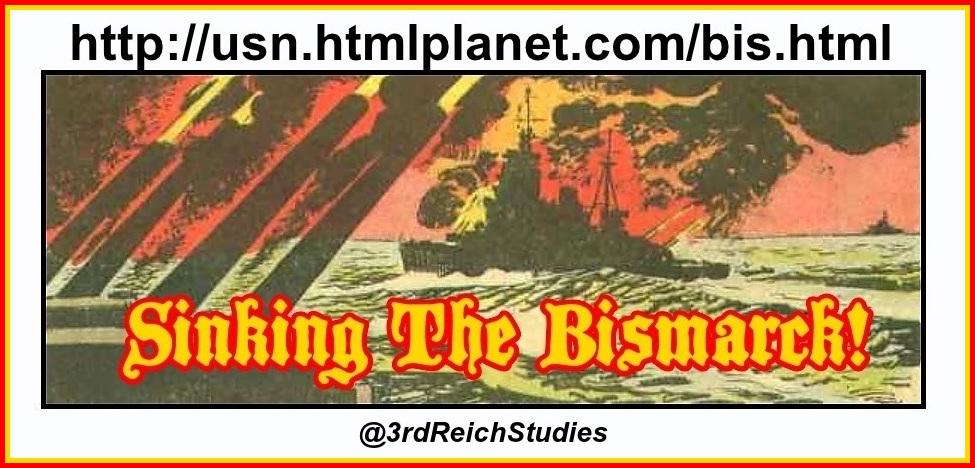May 7, 1940: The US fleet moves its headquarters from San Pedro, California, to Pearl Harbor. Admiral James Otto Richardson, Commander in Chief of the Pacific Fleet, is opposed to the redeployment, telling FDR that defending a perimeter so far removed is not a realistic option. Roosevelt replies, "Jim, you just don't get it." Note: In February, 1941, Richardson will be replaced by Husband E. Kimmel.
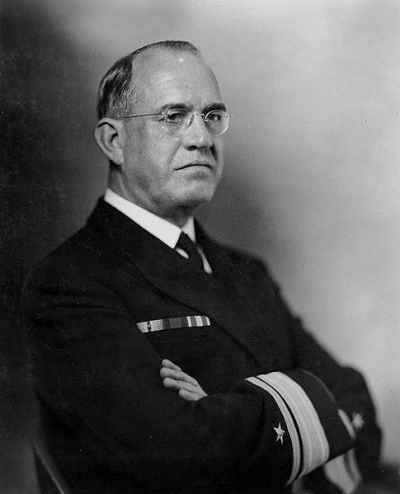
From an interview of Rear Admiral James Otto Richardson (above) by Lieutenant (j.g.) Edward Hanity. During this post-attack inquiry on behalf of Admiral Kimmel, the former Commander in Chief of the Pacific Fleet channels Aesop:
Assume you were the leader of the greatest nation in the world, and assume that you saw, in another hemisphere, the development of a power which you regarded, with reasonable support, as a total threat to Western Civilization as you knew it. Supposing, however, that for various reasons your conception of the danger was not shared by your constituents, your own people. And you saw the total destruction of Western civilization in the hands of this adversary, and you detected in your own people, at the time, on the basis of everything they knew, a lack of appreciation of the problem. Assume that you saw that the only salvation of Western civilization was to repel that particular power but that that required you to enter a foreign war for which your people were not psychologically or militarily prepared.
Assume that what was needed to galvanize your people for a united approach towards this basic danger to civilization was an incident in which your posture was clearly of passive non-aggression and apparent un-preparedness; and the incident in question was a direct act of aggression which had no excuse or justification. Assume that you saw this potentiality developing on the horizon and it was the solution to the dilemma, as you saw it, of saving civilization and galvanizing your own people. It is conceivable, is it not, that you might be less disposed to create a situation in which there might be doubt as to who struck the first blow. You'd want to be sure that whatever the incident, it happened under circumstances where it was perfectly clear that you were not the aggressor, and the resulting incident galvanized your own people to a realization of the terrible threat which they faced from this totalitarian force. Now just think about that. I don't say it's an hypothesis even. It's a fable. You just think about that fable as you study some of this material. And it's conceivable that it might have some enlightening factors. (Toland II)
May 10, 1940: The Nazis invade France, Belgium, Luxembourg and the Netherlands; Winston Churchill becomes British Prime Minister.
May 16, 1940: From a Memorandum by Secretary of State Hull regarding a conversation with Japanese Ambassador Horinouchi:
The Ambassador then made some reference to the Monroe Doctrine in connection with the West Indies situation, and I replied that I had seemingly in vain sought to point out to his Government that, under the Monroe Doctrine, his country's merchant ships have equal access to every harbor in the Western Hemisphere (not including a special arrangement between the United States and Cuba), while under the policy which his Government is seeking to impose in the Pacific Ocean area, the United States and other countries are to be denied equality of trade and industrial opportunity in every Chinese port, and yet his Government seems to look with complacency on
this conflicting situation... FDR delivers a Fireside Chat to the American people:
...Of these 215 ships we have commissioned 12 cruisers; 63 destroyers; 26 submarines; 3 aircraft carriers; 2 gunboats; 7 auxiliaries and many smaller craft. And among the many ships now being built and paid for as we build them are 8 new battleships. Ship construction, of course, costs millions of dollars more in the United States than anywhere else in the world; but it is a fact that we cannot have adequate navy defense for all American waters without ships—ships that sail the surface of the ocean, ships that move under the surface and ships that move
through the air... Secretary of State Hull to US Ambassador Grew in Japan:
...Consideration is being given by various countries which are not yet involved in the European war to the question of whether they will throw in their lot with such countries as Germany which are committed to the use of force for purposes of coercion and conquest or whether they will give their support and adherence to policies and principles of the character to which the United States and a large number of other nations are committed. It is indicated by your reports and by press despatches that the various aspects of that general question are being studied intensively by the Japanese Government. We of course desire to be informed of any significant indications discerned by you regarding the direction in which the thought, of the Japanese Government is moving
in this matter... While evacuating British troops from Norway in 1940, the aircraft carrier
HMS Glorious is sunk with the loss of over 1,200 lives.
June 10, 1940: Mussolini brings Italy into World War II as the French government flees Paris.
June 18, 1940: From a speech in the House of Commons by Prime Minister Winston Churchill:
June 20, 1940: From an address delivered at Harvard University by US Secretary of State Cordell Hull:
These are black days for the human race. These are ominous days for us in this country. There are at work in the world today powerful forces the significance of which no individual and no nation can ignore without falling into a position of the gravest danger and of the utmost jeopardy. These forces are not new in the experience of mankind. They rose on many occasions in the past and, for varying periods and with varying intensity, held sway over human affairs. They spring today from the same source from which they have always sprung in the past-from godless and soulless lust for power which seeks to hold men in physical slavery and spiritual degradation and to displace a system of peaceful and orderly relations among nations by the anarchy of wanton violence
and brute force... An Armistice is signed between France and Germany. Under its terms, the French army is to be disbanded and two thirds of France is to be occupied by the Germans.
June 28, 1940: As the world's attention is occupied elsewhere, the Soviet Union invades and annexes Bessarabia, Northern Bukovina and Hertza County.
July 10–October 31, 1940: The Battle of Britain rages.
July 16, 1940: US State Department Press Release:
The Secretary of State, in reply to inquiries by press correspondents for comment in regard to reports that, at the instance of the Japanese Government, the British Government would prohibit temporarily the movement of certain commodities through Burma into China over what is known as the Burma Route, said that this Government has a legitimate interest in the keeping open of arteries of commerce. in every part of the world and considers that action such as this, if taken, and such as was taken recently in relation to the Indochina railway would constitute unwarranted interpositions of obstacles to world trade.
August 1940: A team of US Army cryptoanalysts under William F. Friedman succeed in breaking Japan's top secret Purple Code, which is used for diplomatic communications.
September 3, 1940 President Roosevelt addresses Congress
:
The right to bases in Newfoundland and Bermuda are gifts—generously given and gladly received. The other bases mentioned have been acquired in exchange for 50 of our over-age destroyers. This is not inconsistent in any sense with our status of peace. Still less is it a threat against any nation. It is an epochal and far-reaching act of preparation for continental defense in the face of grave danger. Preparation for defense is an inalienable prerogative of a sovereign state. Under present circumstances this exercise of sovereign right is essential to the maintenance of our
peace and safety... US State Department Circular:
The Secretary of State on September, 6 sent the following instruction to diplomatic missions of the United States in all the other American republics. It is desired that you formally notify the Government to which you are accredited that the United States has acquired the right to lease naval and air bases in Newfoundland, and in the islands of Bermuda, the Bahamas, Jamaica, St. Lucia, Trinidad, and Antigua, and in British Guiana.
The Government of the United States has taken this step to strengthen its ability not only to defend the United States but in order the more effectively to cooperate with the other American republics in the common defense of the hemisphere. The resulting facilities at these bases will, of course, be made available alike to all American republics on the fullest cooperative basis for the common defense of the hemisphere and in entire harmony with the spirit of the pronouncements made and the understandings reached at the conferences of Lima, Panama, and Habana.
September 12, 1940: From US Ambassador Grew in Japan to Secretary of State Hull:
...Whatever the intentions of the present Japanese Government may be there cannot be any doubt that the military and other elements in Japan see in the present world situation a "golden opportunity" to carry their dreams of expansion into effect; the German victories, like strong wine, have gone to their heads; they have believed implicitly until recently in Great Britain's defeat; they have argued that the war will probably be ended in a quick German victory and that Japan's position in Greater East Asia should be consolidated while Germany is still agreeable and before Japan might be robbed of her far-flung control in the Far East by the eventual hypothetical strengthening of the German naval power; although carefully watching the attitude of the United States they have discounted effective opposition
on our part... : From Kido's diary
:
... (Hirohito discussed) the Tripartite Alliance and the form the rites should take to commemorate it. The Emperor asked the Imperial Household Minister to consult past records to find out what kind of sacred rituals took place at the time of the signing of the (1904) Anglo-Japanese Friendship Treaty. The Imperial Household Minister had discovered there had been no Shinto religious rites. The Emperor has decided that, dealing with this highly important occurrence...we should have a special ceremony at the shrine inside the palace, and ask for the blessing of the Gods on his Tripartite Pact. (Behr)
September 25, 1940: Ribbentrop to Molotov:
This alliance (a proposed German-Japanese Pact) is directed exclusively against the American warmongers. To be sure that is, as usual, not expressly stated in the treaty, but can be unmistakably inferred from its terms. Its exclusive purpose is to bring the elements pressing for America's entry into the war to their senses by conclusively demonstrating to them if they enter the present struggle they will automatically have to deal with the three great powers as adversaries. (IMT)
September 26, 1940: Japanese troops attack French Indochina.
September 26, 1940: From official notes of the German naval war staff:
Naval Supreme Commander with the Fuehrer. Naval Supreme Commander presents his opinion about the situation: The Suez Canal must be captured with German assistance. From Suez, advance through Palestine and Syria; then Turkey in our power. The Russian problem will then assume a different appearance. Russia is fundamentally frightened of Germany. It is questionable whether action against Russia from the north will then be still necessary.
September 27, 1940: Nazi Germany, Italy, and Japan sign a formal alliance called Tripartite Pact, a 10 year military and economic alliance forming the foundation of the Axis alliance.
September 27, 1940: From a statement by Secretary of State Hull:
The reported agreement of alliance (Tripartite Pact) does not, in the view of the Government of the United States, substantially alter a situation which has existed for several years. Announcement of the alliance merely makes clear to all a relationship which has long existed ... to which this Government has repeatedly called attention. That such an agreement has been in process of conclusion has been well known for some time, and that fact has been fully taken into account by the Government of the United States in the determining of
this country's policies... FDR delivers a Fireside Chat to the American people:
For, on September 27th, 1940, this year, by an agreement signed in Berlin, three powerful nations, two in Europe and one in Asia, joined themselves together in the threat that if the United States of America interfered with or blocked the expansion program of these three nations—a program aimed at world control—they would unite in ultimate action against the United States. The Nazi masters of Germany have made it clear that they intend not only to dominate all life and thought in their own country, but also to enslave the whole of Europe, and then to use the resources of Europe to dominate the rest
of the world... From The Roots of the Modern American Empire, by William Appleman Williams: (T)he leaders of Germany, Japan, and Italy were working with the most powerful weapon available—the determination, born equally of desperation and hope, of large numbers of people to improve, radically and immediately, the substance and tone of their daily lives. ...
(Franklin Roosevelt, pursuing) traditional policies of economic and ideological empire (portrayed Germany, Italy, and Japan) as dangers to the well-being of the United States. This happened before those countries launched military attacks into or against areas that the United States considered important to its economic system. It occurred instead as those nations began to compete vigorously with American entrepreneurs in Latin America and Asia...American leaders began to go to war against the Axis in the Western Hemisphere.
From The Cycles of American History, by Arthur M. Schlesinger Jr.: The Open Door thesis (Note: The previous item is an example) has no place for the balance of power as a factor in foreign policy. The thesis omits the possibility that, in Jefferson's old proposition, it might not be in the interest of the United States to see the whole of Europe wielded by a single hand. In its ethnocentric preoccupation with America as the only actor on the world scene, the thesis ignores the expansionist drives of Nazism, Fascism and Japanese militarism and reduces Hitler, Mussolini and the Japanese imperialists to hapless victims of the American drive for foreign markets.
Moreover, if the Open Door interpretation were correct, the United States would surely have supported Japan, not China, in the Far East in the years before the war. American exports to Japan in the 1930s exceeded its exports to all of South America and far exceeded those to China; indeed, Japan provided the third largest market for the American surplus, surpassed only by Great Britain and Canada. If foreign markets were the determination of policy, there would have been no Pearl Harbor, except on the metaphysical theory that hard-headed capitalists preferred a nebulous China market on the bush to as profitable Japanese market on hand.
October 8, 1940: Large numbers of German troops arrive in Romania to train the Romanian army, and to protect Romanian oil fields from British sabotage. The arrival of German troops effectively places Romania under German control.
October 8, 1940: From the Japanese Embassy to the US State Department:
The fact that the majority of essential articles and materials that Japan desires to import from America is placed under licensing system is causing a feeling of tension among the people of Japan, who naturally presume that the system is intended to be a precursor of severance of economic relations between Japan and the United States. In view of the high feeling in Japan it is apprehended that, in the event of continuation by the United States Government of the present attitude toward Japan in matters of trade restriction, especially if it leads to the imposition of further measures of curtailment, future relations between Japan and the United States
will be unpredictable... Harada, Saionji's confidential secretary, records remarks made by Yamamoto during a dinner conversation.
(The Admiral, who had already begun planning a surprise strike on Pearl Harbor, begins by declaring that the idea of war between Japan and the US is) outrageous...However, with the understanding of the Navy Minister and the Chief of Naval Staff, it is also necessary to make preparations for whatever the Navy is to undertake...In my opinion in order to fight the United States, we must fight with the intention of challenging practically the whole world. In short, even if a non-aggression pact is concluded with the Soviets, Russia cannot be entirely relied upon. While we are fighting the US, who can guarantee that they will observe the pact and not attack us from the rear? At any rate, as long as matters have come to this point, I shall extend my utmost efforts and will probably die fighting on the battleship Nagata. During that time, Tokyo will probably be burnt to the ground...Well-informed Japanese may pray for miracles, but realistically they should be prepared to do or die. (Behr)
October 26, 1940: From an address delivered by US Secretary of State Cordell Hull:
We have sought in every appropriate way to discourage conquest and to limit the area of war. We have followed consistently the policy of refusing recognition of territorial changes effected by force or threat of force. We have taken every opportunity to express our concern over threatened changes by force in the existing political status of colonial possessions, disturbance of which would extend the area of hostilities. We have placed under license the funds of invaded countries. In these respects, too, we intend to
continue our activities... Italian Duce Benito Mussolini orders the invasion of Greece by Italian troops in Albania. The Italian forces run into a stubborn resistance.
October 29, 1940: US Secretary of War, Henry L. Stimson, draws the first number in the first peacetime military draft in US history. Note: Stimson, a Republican, had been Taft's Secretary of War, Governor of the Philippines under Coolidge, and Secretary of State under Hoover.
October 30, 1940: To support the Greek government, the British send an expeditionary force to Crete and other Greek islands. In addition, the Soviet government sends 134 fighter aircraft to the Greeks to help stem the Italian invasion.
November 4, 1940: Admiral Yamamoto to Mr. Mitsuari Takamura:
I thank you for your congratulatory telegram on the naval review. Owing to the preparation for war, only an element of the fleet participated in the naval review, so that it was not such a big one. Notwithstanding, the press wrote it up in headlines; this made me feel somewhat irritated. When I think of the situation the Empire is now facing, I have no time to be impressed by such an honor as the naval review. I feel now that there is no other way but to devote every effort for completion of the preparations for war.
This moment is the critical time upon which the fate of the country depends. This is not because I fear the military strength of the United States and Great Britain, but because there is no able man among the authorities and also I fear such a crisis as this might be an unprecedented one. How dangerous the future of the Empire would be! I can't help exclusively relying upon the Emperor's virtue and God's help. However, I feel that there is no other choice for me, who am taking the present position at this most critical moment, but to make every possible effort I can, while keeping in mind the following poem by the Emperor Meiji: "Even though too much for me the burden be—I won't care because it is for the sake of—the country and the people."
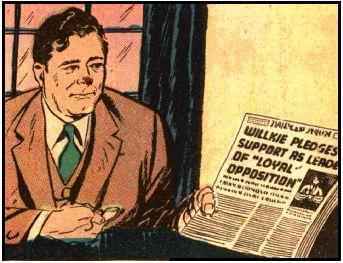
Wendell Lewis Willkie loses the US election to incumbent President Franklin D. Roosevelt. Note: Willkie is a dark horse Republican who had crusaded against Roosevelt's failure to end the Depression and his eagerness for war. However, Willkie's foreign policy perscriptions are virtually identical to his opponent, and he will soon be engaged in diplomatic missions—under the direction of Roosevelt—on behalf of the US. (Barnard)
November 11–12, 1940 Battle of Taranto
: The British aircraft carrier HMS
Illustrious demonstrates the vulnerability of moored capital ships to surprise attack by carrier-based aviation, by attacking the Italian fleet at Regia Marina naval base in the harbor of Taranto. The enemy fleet is devastated as a consequence of the attack by a mere 12 British Fairey Swordfish torpedo bombers, launched from the Illustrious. At a total cost of 2 aircraft destroyed, 2 pilots killed and two captured, the British kill 59 Italian sailors and wound 600, sink 3 battleships, and severely damage 2 other battleships and a light cruiser. Note: The Japanese planning staff will study the Taranto attack intensively while masterminding their attack on Pearl Harbor.
November 12–14, 1940: Soviet Foreign Commissar Vyacheslav Molotov travels to Berlin to meet with German Chancellor Adolf Hitler.
November 14, 1940: From official notes of the German naval war staff:
Naval Supreme Commander with the Fuehrer. Fuehrer is "still inclined" to instigate the conflict with Russia. Naval Supreme Commander recommends putting it off until the time after the victory over England, since there is heavy strain on German forces and the end of warfare is not in sight.
November 15, 1940: Yamamoto is promoted to full admiral.
November 20, 1940: Hungary's Regent, Admiral Miklós Horthy, takes Hungary into the Tripartite Pact, an alliance with Germany, Italy, and Japan.
November 23, 1940: Romania's King Mihai I, and the military government of Ion Antonescu, sign the Tripartite Pact, an alliance with Hungary, Germany, Italy, and Japan.
December 18, 1940: German military planners begin work on Operation Barbarossa, the Nazi invasion of the USSR. (Clark II)
December 27, 1940: From official notes of the German naval war staff:
Naval Supreme Commander with the Fuehrer. Naval Supreme Commander emphasizes again that strict concentration of our entire war effort against England as our main enemy is the most urgent need of the hour. On the one hand, England has gained strength by the unfortunate Italian conduct of the war in the eastern Mediterranean and by the increasing American support. On the other hand, however; she can be hit mortally by a strangulation of her ocean traffic which is already taking effect. What is being done for submarine and naval air force construction is much too little. Our entire war potential must work for the conduct of the war against England; thus for the Navy and Air Force, every dispersion of strength prolongs the war and endangers the final success. Naval Supreme Commander voices serious objections against Russia campaign before the defeat of England.
January 7, 1941: Admiral Yamamoto to Navy Minister Oikawa:
The most important thing we have to do first of all in a war with the US, I firmly believe, is to fiercely attack and destroy the US main fleet at the outset of the war, so that the morale of the US Navy and her people goes down to such an extent that it cannot be recovered. Only then shall we be able to secure an invincible stand in key positions in East Asia, thus being able to establish and keep the East Asia Co-Prosperity Sphere. Well then, what policy should we take to accomplish this? ....
In case of a majority of the enemy main force being in Pearl Harbor, to attack it thoroughly with our air force, and to blockade the harbor. 2. In case they are staying outside the harbor, too, to apply the same attack method as above...It is not easy to succeed in either case, but I believe we could be favored
by God's blessing... From the new Japanese Field Service Code:
Should there be an enemy who dares to oppose the Imperial Army, the Army must resolutely resort to force of arms and deal him a crushing blow. However, even though force may compel the enemy to submit, should a lapse in virtue occur by striking of those who do not resist or by failure to show kindness to those who surrender, it cannot be said that such an army is perfect. Modesty in its strength, unostentatious in its kindness, the Imperial Army becomes the object of admiration when it quietly displays its valour and benevolence. The mission of the Imperial Army lies in making the Imperial virtues the objects of universal admiration through the exercise of justice
tempered with mercy... Japanese Prime Minister Fumimaro Konoye addresses the Imperial Diet:
Japan is now confronted with an emergency unparalleled in her long history. The present world situation makes it urgent that she should perfect, at home, the State structure for national defence capable of enhancing the total strength of the nation and replete [with] armaments sufficient for achieving
the national purpose... US Secretary of Navy Stark to US Secretary of War Stimson:
If war eventuates with Japan, it is believed easily possible that hostilities would be initiated by a surprise attack upon the fleet or the naval base at Pearl Harbor. .… The dangers envisioned, in their order of importance and probability, are considered to be (1) air bombing attack, (2) air torpedo-plane attack, (3) sabotage, (4) submarine attack, (5) mining, (6) bombardment by gunfire. Defense against all but the first two of these dangers appears to have been provided for satisfactorily… (Costello II)
January 27, 1941: From US Ambassador Grew in Japan to Secretary of State Hull:
A member of the Embassy was told by my...colleague that from many quarters, including a Japanese one, he had heard that a surprise mass attack on Pearl Harbor was planned by the Japanese military forces, in case of "trouble" between Japan and the United States; that the attack would involve the use of all the Japanese military facilities. My colleague said that he was prompted to pass this on because it had come to him from many sources, although the plan seemed fantastic.
January 30, 1941: Hitler speaks in Berlin:
That the German nation has no quarrel with the Americans is evident to everybody who does not consciously wish to falsify truth. At no time has Germany had interests on the American Continent except perhaps that she helped that Continent in its struggle for liberty. If states on this continent now attempt to interfere in the European conflict, then the aim will only be changed more quickly. Europe will then defend herself. And do not let people deceive themselves. Those who believe they can help England must take note of one thing: every ship, whether with or without convoy which appears before our torpedo tubes is going
to be torpedoed... From Commander of the Combined Fleet, Vice Admiral Isoruku Yamamoto, to Rear Admiral Onishi:
In the event that war breaks out between Japan and America, attack the main force of the American Fleet in Pearl Harbor with our main carrier fleet, the First Carrier Division and the Second Carrier Division. It is important that the American Fleet does not go into the western Pacific until the first stage of the operation is over. I am hoping to be allowed to command such an attacking unit by an order from the Emperor. Make an outline of the plans for the operation that I mentioned. (Dillon) Note: Times and dates for all Japanese documents with the (Dillon) designation are in Tokyo time.
February 1941: Rear Admiral Kimmel becomes Commander in Chief of the Pacific Fleet, with the temporary rank of admiral.
February 7, 1941: Marshall (above) to Short:
My impression of the Hawaiian problem has been that if no serious harm is done us during the first six hours of known hostilities, thereafter the existing defenses would discourage an enemy against the hazard of an attack. The risk of sabotage and the risk involved in a surprise raid by air and by submarine, constitute the real perils of the situation…Please keep clearly in mind in all your negotiations that our mission is to protect the base and the Naval concentration… (Costello II)
February 9, 1941: Churchill broadcasts an address to the British people:
...we must therefore expect that Herr Hitler will do his utmost to prey upon our shipping and to reduce the volume of American supplies entering these Islands. Having conquered France and Norway, his clutching fingers reach out on both sides of us
into the ocean... Admiral Yamamoto to Secretary of the Navy Department Shigeharu Enomoto:
I agree with your opinions concerning how to get into a war. But it is a problem, to what extent those persons who were so beside themselves with joy, making out such a thing as the Tripartite Pact, would stick to their own opinions in the hour of need. To me there is a smell of changing the present post; however, it causes me some confusion in calculating which is better for me, either to attempt to improve the naval organization in Tokyo or to continue to make the fleet as in the pink as ever...
March 1, 1941: Bulgaria's King Boris III, signs the Tripartite Pact, an alliance with Romania, Hungary, Germany, Italy, and Japan.
March 5, 1941: Marshall to Short (above):
I would appreciate your early review of the situation in the Hawaiian Department with regard to defense from air attack. The establishment of a satisfactory system of coordinating all means available to this end is a matter of first priority… (Costello II)
March 5, 1941: Basic Order Number 24: The Fuehrer had issued the following order regarding collaboration with Japan:
It must be the aim of the collaboration based on the Three-Power Pact, to induce Japan, as soon as possible, to take active measures in the Fast East. Strong British forces will thereby be tied down, and the center of gravity of the interests of the United States of America will be diverted to the Pacific. The sooner she intervenes, the greater will be the prospects of success for Japan in view of the still undeveloped preparedness for war, on the part of her adversaries. The "Barbarossa" operation will create particularly favorable political and military prerequisites for this. (Marginal note:) Slightly exaggerated. 2. To prepare the way for the collaboration it is essential to strengthen the
Japanese military potential... (IMT)
From Grand Admiral Raeder's IMT testimony: First of all, the political decision by Hitler, the head of the State; then the directive of the Supreme Commander of the Armed Forces to the Armed Forces; then the conclusions drawn by the commanders-in-chief of the separate branches of the Wehrmacht. So, after I received the directive of 5 March, I had to contemplate how Japan, after entering the war, could strategically be used with the best results. And that depended on how we could most effectively wound our main opponent, England, on the sea. In this connection I had to insist most urgently that Japan move against Singapore since there were also circles who were of the opinion that Japan should attack Vladivostok, which would have been a grave mistake. England's power center in East Asia had to be attacked. But the very fact that I believed that the capture of Singapore would cause the United States of America to shy away from the war occasioned this proposal of mine, and not the opposite.
March 8, 1941: From a Memorandum by Secretary of State Hull:
The Japanese Ambassador called at my apartment at the Carlton Hotel by an indirect arrangement based on the equal and joint initiative of himself and myself growing out of his talk with the President in my presence some days ago...I then inquired of the Ambassador whether the military groups in control of his Government could possibly expect important nations like the United States to sit absolutely quiet while two or three nations before our very eyes organized naval and military forces and went out and conquered the balance of the earth, including the seven seas and all trade routes and the other four continents. Could they expect countries like mine to continue to remain complacent as that movement is going on?
I inquired further what countries like mine would have to gain by remaining complacent in the face of a movement to substitute force and conquest for law and justice and order and fair dealing and equality. The Ambassador sought to play down the view that such military conquest was really in the mind of his Government and he then said that embargoes by this country were, of course, of increasing concern, and that he did not believe there would be any further military movements unless the policy of increasing embargoes by this country should force his Government, in the minds of those in control, to take
further military steps... 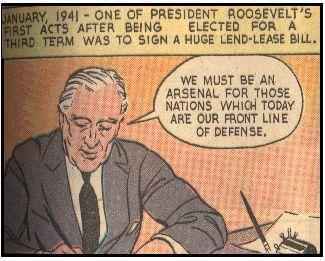
Thinly slicing US "neutrality," the US Congress passes the Lend-Lease Bill, which enables Britain and her Allies to borrow money to buy additional food and arms. A time limit is placed on the operation of the act—until June 1943. A motion originally passed in the House forbidding US warships to give protection to convoys of foreign ships is defeated. Also to be allowed are transfers of ships to other countries solely on Presidential authority without reference to Congress. Note: Date on image in incorrect.
March 18, 1941: Notes from a meeting between Raeder and Hitler:
Japan must take steps to seize Singapore as soon as possible, since the opportunity will never again be as favorable (whole English fleet contained; unpreparedness of USA for war against Japan; inferiority of US fleet vis-a-vis the Japanese). Japan is indeed making preparations for this action, but according to all declarations made by Japanese officers she will carry it out only if Germany proceeds to land in England. Germany must therefore concentrate all her efforts on spurring Japan to act immediately. If Japan has Singapore all other East Asiatic questions regarding the USA and England are thereby solved (Guam, Philippines, Borneo, Dutch East Indies). Japan wishes, if possible, to avoid war against the USA. She can do so if she determinedly takes Singapore as soon as possible. (IMT)
From Raeder's IMT testimony: It is entirely clear that, since I was involved in a naval war with England with my small German Navy, I did not want, under any circumstances, to have America on my neck as well; and it has been discussed here repeatedly that my most urgent effort during the entire first few years of the war was to avoid, under all circumstances, being involved with the United States...On the other hand, the United States from the end of 1940 on, at the latest, and during the entire year of 1941, exerted pressure on us in our naval warfare wherever possible and committed actions which could be interpreted as definitely not neutral. I remind you merely of the repairing of British warships in the United States, something which up until that time was completely impossible and unheard of; and Roosevelt's orders to shoot given in July and in September 1941; attacks by the American destroyers Greer and Kearney in the Atlantic on our U-boats. In two cases U-boats were pursued with depth charges for 2 hours until finally they surfaced and fired, in one case damaging one destroyer.
Despite all this, in June 1941 I reported to Hitler that we were continuing not to disturb the merchantmen of the United States in any way-with the result that United States merchantmen were crossing the Atlantic completely unmolested on sea lanes of their own choosing, were in a position to give reports about our U-boats and our sea warfare without our preventing them from doing so; because of this the British were in a position to camouflage their ships as American ships. That they did. The first time our pocket battleship Admiral Scheer, while crossing the Atlantic, searched a ship flying the American flag it turned out to be the British ship Canadian Cruiser. Despite all this I recommended to the Fuehrer, and he fully approved my suggestion, that we should take no measures against American ships. That we did not go to Halifax to lay mines Admiral Wagner has already mentioned. I need not mention that any further. ....
I should like to picture very briefly the development which led to this proposal. This was not anything that I did on my own initiative, but rather at the beginning of the year 1941 political negotiations were carried on with Japan partly by the Fuehrer and partly by the Foreign Minister. I was not even called into these negotiations, and I must say regrettably so, for at these negotiations many things were discussed which were not correct. However on the other hand this shows again that there can be no talk about a conspiracy. Contact was made, and then the visit of the Foreign Minister Matsuoka took place, I believe, in March. On the basis of this entire development the Fuehrer, on 5 March 1941, issued Directive Number 24.
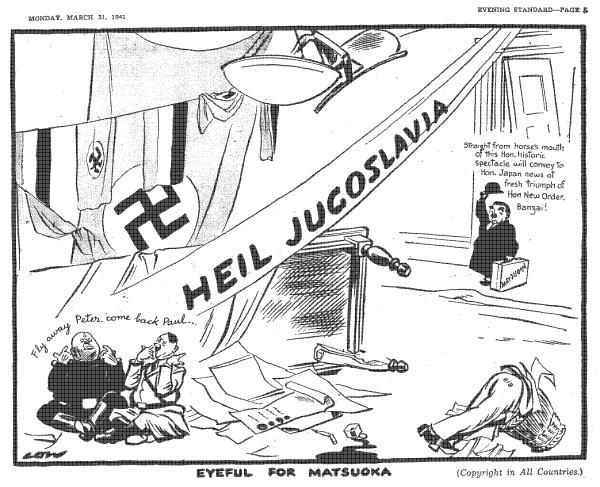
Fearing that Yugoslavia would be invaded otherwise, Regent Prince Paul signs the Tripartite Pact with Bulgaria, Romania, Hungary, Germany, Italy, and Japan.
March 29, 1941: From notes of a meeting between Ribbentrop and the Japanese Foreign Minister, Matsuoka, in Berlin:
(Ribbentrop) did not know how the situation would develop. One thing was certain, however, namely that Germany would strike immediately, should Russia ever attack Japan. He was ready to give Matsuoka this positive assurance so that Japan could push forward to the South on Singapore without fear of possible complications with Russia. The largest part of the German Army was on the Eastern frontiers of the Reich anyway and fully prepared to open the attack at any time. He (the RAM), however, believed that Russia would try to avoid developments leading to war.
Should Germany, however, enter into a conflict with Russia, the USSR would be finished off within a few months. In this case Japan would have, of course, even less reason to be afraid than ever, if she wants to
advance on Singapore... (IMT)
From the
Martin-Bellinger Report, an assessment of the vulnerabilities of the naval base at Pearl Harbor written by General Martin and Admiral Bellinger:
A declaration of war might be preceded by
1. A surprise submarine attack on ships the operating area.
2. A surprise attack on Oahu including ships and installations in Pearl Harbor.
3. A combination of these two.
(b) It appears that the most likely and dangerous form of attack on Oahu would be an air attack. It is believed that at present such an attack would most likely be launched from one or more carriers which would probably approach inside of three hundred miles.
(
c) A single attack might or might not indicate the presence of more submarines or more planes awaiting to attack after defending aircraft have been drawn away by the original thrust.
(
d) Any single submarine attack might indicate the presence of a considerable undiscovered surface force probably composed of fast ships accompanied by a carrier.
(
e) In a dawn air attack there is a high probability that it could be delivered as
a complete surprise... From notes of a meeting between Hitler, Matsuoka (above) and Ribbentrop:
Matsuoka then spoke of the general high morale in Germany, referring to the happy faces he had seen everywhere among the workers during his recent visit to the Borsig. works. He expressed his regret that developments in Japan were not yet as far advanced as in Germany and that in his country the intellectuals still exercised considerable influence. The Reich Foreign Minister replied that at best a nation which had realized its every ambition could afford the luxury of intellectuals, some of whom are parasites, anyway. A nation, however, which has to fight for a place in the sun must give them up. The intellectuals ruined France; in Germany they had already started their pernicious activities when National Socialism put a stop to these doings; they will surely be the cause of the downfall of Britain, which is to be expected with certainty... (IMT)
April 6, 1941: On Palm Sunday, Hitler invades Yugoslavia and Greece.
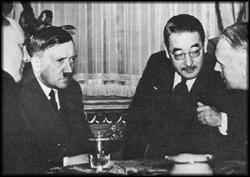
From The Rise and Fall of the Third Reich, by William L. Shirer: Adolf Hitler's reckless promise to Japan had been made during a series of talks in Berlin with Yosuke Matsuoka, the pro-Axis Japanese Foreign Minister, in the spring of 1941 just before the German attack on Russia. The captured German minutes of the meeting enable us to trace the development of another of Hitler's monumental miscalculations. They and other Nazi documents of the period show the Fuehrer too ignorant, Goering too arrogant and Ribbentrop too stupid to comprehend the potential military strength of the United States—a blunder which had been made in Germany during the First World War by Wilhelm II, Hindenburg, and Ludendorff.
There was a basic contradiction from the beginning in Hitler's policy toward America. Though he had only contempt for her military prowess he endeavored during the first two years of the conflict to keep her out of the war. This...was the main task of the German Embassy in Washington, which went to great lengths, including the bribing of Congressmen, attempting to subsidize writers and aiding the America First Committee, to support the American isolationists and thus help to keep America from joining Germany's enemies in the war.
That the United States, as long as it was led by President Roosevelt, stood in the way of Hitler's grandiose plans for world conquest and the dividing up of the planet among the Tripartite powers the Nazi dictator fully understood, as his various private utterances make clear. The American Republic, he saw, would have to be dealt with eventually and, as he said, "severely." But one nation at a time. That had been the secret of his successful strategy thus far. The turn of America would come, but only after Great Britain and the Soviet Union had been struck down. Then, with the aid of Japan and Italy, he would deal with the upstart Americans, who, isolated and alone, would easily succumb to the power of the victorious Axis. Japan was the key to Hitler's efforts to keep America out of the war until Germany was ready to take her on.
April 20, 1941: From official notes of the German naval war staff: Naval Supreme Commander with Fuehrer.
Navy Supreme Commander asks about result of Matsuoka's visit and evaluation of Japanese-Russian pact....Fuehrer has informed Matsuoka that Russia will not be touched if she behaves in a friendly manner according to the treaty. Otherwise, he reserves action for himself. Japan-Russia pact has been concluded in agreement with Germany and is to prevent Japan from advancing against Vladivostok and to cause her to attack Singapore. (IMT)
May 8, 1941: The German raider
Penguin is sunk by HMS
Cornwall off the Seychelles Islands in the Indian Ocean.
May 11, 1941: From a Memorandum by Secretary of State Hull:
The Japanese Ambassador called at my hotel apartment at his request...I then inquired whether Matsuoka would conduct the negotiations at Tokyo. The Ambassador replied that he would, but that the Army, the Navy and Konoye would participate in the work of carrying on the negotiations, although Konoye did not make it a habit of interfering materially in such work of the Foreign Office. I said that Matsuoka was, of course, a politician and that he had recently been quoted as making, in a purely gratuitous way, numerous unfriendly remarks about the United States, as well as announcing ideas and doctrines diametrically opposed to most of the fundamental principles set out in the document which the Ambassador prepared some weeks ago, and with the contents of which we were all familiar.
I added that, in these circumstances, there will be real difficulty to persuade even my associates of the absolute dependability of Matsuoka's acts and utterances. I said that I mentioned this in order that the Ambassador would fully understand my difficulties in more respects than one. The Ambassador not only did not take issue with anything I said, but I felt that he was really in harmony with the statements I made about Matsuoka. The Ambassador then said that Japan was very desirous of keeping war out
of the Pacific... Japanese Ambassador Nomura formally delivers a
Draft Proposal to US Secretary of State Hull.
May 21, 1941: The SS
Robin Moor, a US merchant steamship carrying nine officers, 29 crewmen, eight passengers, and a commercial cargo from New York to Mozambique via South Africa, is attacked by
U-69. Although the
Robin Moor is flying the flag of a neutral country (the US is still not at war with anyone), her mate is subsequently told by the U-boat crew that they had decided to "let us have it." After a brief period for the ship's crew and passengers to board her four lifeboats, the U-boat fires a torpedo and then shells the vacated ship. Once the ship sank beneath the waves, the submarine's crew pulled up to Captain W.E. Myers' lifeboat, left him with four tins of ersatz bread and two tins of butter, and explained that the ship had been sunk because she was carrying supplies to Germany's enemy.
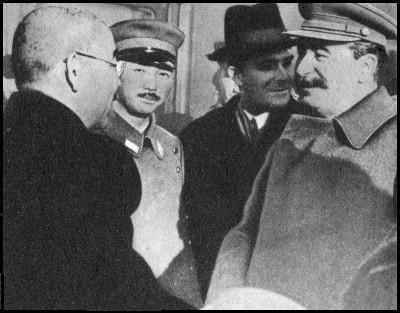
From Stalin: a Political Biography, by I. Deutscher: During Matsuoka's visits to Moscow—the first in March 1941 and the second in April 1941—Stalin was unusually animated and even talkative. "We are both Asiatics," he told his visitor...He delighted in demonstrating his Asiatic outlook to his Japanese guest. Both had a peculiar way of wearing their hearts on their sleeves and holding daggers up their sleeves. Matsuoka, the scion of a great feudal family, introduced himself as a "moral communist." Stalin listened to the stories about the heroic exploits of Matsuoka's ancestors and to his assurances that Japan was fighting in China not the Chinese, but Anglo-Saxon liberalism bent on overthrowing Japan's "moral communism."
From political philosophy the two men turned to bargaining over concessions in northern Sakhalin. They bargained hard, in oriental fashion; and Stalin gesticulating to show that Matsuoka—the heartless creature—was out to strangle him. In his Asiatic panache Stalin had an ulterior motive...he was trying, in his cryptic manner, to convey to Hitler that he, Stalin, had withdrawn from the contest and that he was ready to content himself, as Hitler had advised him through Molotov, with advantages in Asia.
On the day of Matsuoka's departure from Moscow, 18 April, he made an ostentatious gesture calculated to bring his new attitude to Hitler's notice. Quite unexpectedly, he emerged from his seclusion to see off the Japanese Minister at the railway station. In the presence of a large gathering of foreign correspondents and astonished diplomats, he embraced his fellow "Asiatic"; and then, to quote (German minister) Schulenburg, he "publicly asked for me and when he found me came up to me and threw his arm around my shoulders: "We must remain friends and you must do everything to that end!""
May 24, 1941 Operation Rheinuebung
: The German battleship
Bismarck, supported by the heavy cruiser
Prinz Eugen, sinks the British battle cruiser
Hood after firing only three salvoes. There are only 3 survivors out of a crew of 1,421. The
Prince of Wales is also damaged and forced to break off the action.
May 26, 1941 Operation Rheinuebung
: British flying boat spots the
Bismarck at 10:36 AM. Swordfish Torpedo-bombers from the
Ark Royal score hits on the
Bismarck, disabling her steering gear and rendering her un-maneuverable. This will enable the British destroyers to attack after dark.
May 26, 1941 Operation Rheinuebung
: The crippled
Bismarck is relentlessly bombarded by dozens of British warships, including the battleships
Rodney and
King George V. Once her guns are silenced, she is sunk by torpedoes from the cruiser
Dorsetshire. Only 110 survive out of a crew of 2,300.
May 27, 1941: FDR delivers a Fireside Chat:
...between 1933 and this year, 1940—seven fiscal years—your Government will have spent ($1,487,000,000) a billion, four hundred eighty-seven million dollars more than it spent on the Navy during the seven years (before) that preceded 1933. What did we get for the money, money, incidentally, not included in the new defense appropriations—only the money heretofore appropriated? The fighting personnel of the Navy rose from 79,000 to 145,000. During this period 215 ships for the fighting fleet have
been laid down... The representatives of Great Britain, Canada, Australia, New Zealand and the Union of South Africa and of the exiled governments of Belgium, Czechoslovakia, Greece, Luxembourg, the Netherlands, Norway, Poland, Yugoslavia and of General de Gaulle of France, met at the ancient St. James’s Palace and sign a declaration: The only true basis of enduring peace is the willing cooperation of free peoples in a world in which, relieved of the menace of aggression, all may enjoy economic and social security; It is our intention to work together, and with other free peoples, both in war and peace, to this end.
June 21, 1941: US Secretary of State Hull formally delivers a counter-
Draft Proposal to Japanese Ambassador Nomura.
June 22, 1941 Unternehmen Barbarossa
: Operation Barbarossa begins when 4.5 million troops of the Axis powers invade the USSR along an 1,800 mile front. (Clark II)
June 23, 1941: The Luftwaffe destroys over 2,000 Red Air Force aircraft during the first 24 hours of the conflict. In another 24 hours, the largest air force in the world will be totally destroyed. (Clark II)
July 3, 1941: Stalin declares a scorched earth policy against the Nazi invader. (Clark II)
July 6, 1941: From a statement handed by Ambassador Grew in Japan to Mr. Tomohiko Ushiba, Private Secretary of Japanese Prime Minister Prince Konoye:
...Should Japan enter upon a course of military aggression and conquest it stands to reason that such action would render illusory the cherished hope of the American Government, which it understood was shared by the Japanese Government, that peace in the Pacific area, far from being further upset, might now indeed be strengthened and made more secure. It is the earnest hope of the Government of the United States that the reports of Japan's decision to enter upon hostilities against the Soviet Union are not based upon fact, and an assurance to that effect from His Excellency the Prime Minister of Japan would be deeply appreciated by the Government of the United States.
July 7, 1941: War Department Adjutant General to Hawaiian Department Commanding General:
For your information. Deduction from information from numerous sources is that the Japanese Government has determined upon its future policy which is supported by all principal Japanese political and military groups. This policy is at present one of watchful waiting involving possible aggressive action against the Maritime Provinces of Russia if and when the Siberian Garrison has been materially reduced in strength and it becomes evident that Germany will win a decisive victory in European Russia.
Opinion is that Jap activity in the South will be for the present confined to seizure and development of Naval, Army and Air Bases in Indo China although an advance against the British and Dutch cannot be entirely ruled out. The neutrality pact with Russia may be abrogated. They have ordered all Jap vessels in US Atlantic ports to be west of Panama Canal by first of August. Movement of Jap shipping from Japan has been suspended and additional merchant vessels are being requisitioned. (Costello II)
July 7, 1941: President Roosevelt addresses Congress:
...forces of the United States Navy have today arrived in Iceland in order to supplement, and eventually to replace, the British forces which have until now been stationed in Iceland in order to insure the adequate defense of that country. As I stated in my message to the Congress of September third last regarding the acquisition of certain naval and air bases from Great Britain in exchange for certain over-age destroyers, considerations of safety from overseas
attack are fundamental... From a statement handed to Ambassador Grew in Japan by Foreign Affairs Minister Matsuoka:
...It is hardly necessary to state that the prevention of the European War from spreading to the regions of Greater East Asia and the maintenance and preservation of peace in the area of the Pacific have always been the sincere and genuine desire of the Japanese Government which have consistently contributed their earnest efforts toward achieving that high purpose. The Japanese Government wish to state, in reply to the last paragraph of the Message, that they have not so far considered the possibility of joining the hostilities against
the Soviet Union... From Ribbentrop to the German Ambassador in Tokyo:
I request you to use every means in your power to influence Matsuoka, in the way I have indicated, so that Japan will declare war on Russia as soon as possible; for the sooner this happens, the better it will be. It must still be our natural aim to shake hands with Japan on the Trans-Siberian railway before the winter. With the collapse of Russia the position of the countries participating in the Three Power Pact will be so strong that the collapse of England or the complete annihilation of the British Isles will be only a question of time. (IMT)
July 23, 1941: Defeated presidential candidate Wendell Lewis Willkie urges unlimited aid to the United Kingdom in its struggle against Nazi Germany. (Barnard)
July 24, 1941: From a Memorandum by Acting Secretary of State Welles on a Meeting Between President Roosevelt and the Japanese Ambassador:
The President then mentioned the fact that in the United States the belief was apparent that such policies as those which Japan was now pursuing were due to German pressure upon Japan. To this the Ambassador reacted by saying that Japan was, of course, an independent country and that while such pressure might be exercised, decisions on the policy she was pursuing were solely her own and no one else had any responsibility for them. The President then said that one thing the Japanese Government did not understand as clearly as this Government was the fact that Hitler was bent upon world domination and not merely the domination of Europe or of Africa.
The President said that if Germany succeeded in defeating Russia and dominating Europe and then dominating Africa, there wasn't the slightest question in his mind that Germany thereafter would turn her attention to the Far East and likewise to the Western Hemisphere, and, that while such a development might not take place for many years, perhaps even ten years, the laws of chance made it easily possible that in such contingency, the navies of Japan and of the United States would be cooperating together against Hitler as the common enemy. The President reemphasized his belief that what Hitler had in mind was complete domination of the entire world. To this the Ambassador replied that he would like to quote an old Chinese proverb in which he had great faith, namely, "He who continuously brandishes the sword
eventually kills himself...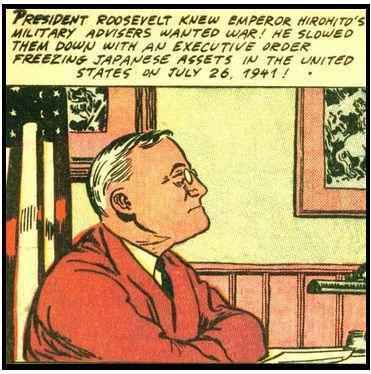
The US government freezes Japanese and Chinese assets, causing a run on Japanese banks.
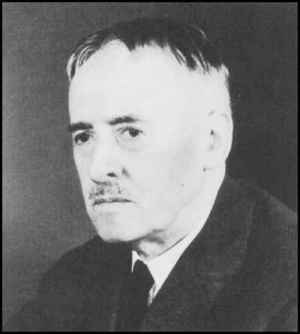
From Infamy by John Toland: A graduate of Yale University, Henry L. Stimson still took seriously its motto, "For God, for country, and for Yale." He carried this messianic message through life, staunchly convinced that the principles of his class and country were best for all the world...This was proven in his persistent hatred and fear of Japan. It had begun, while he was Hoover's Secretary of State, with the Japanese conquest of Manchuria in 1932. Stimson took this as a personal affront, and the bombings of Shanghai further ignited his hot temper. His solution was to apply against the Japanese drastic economic pressure and, if necessary, military and naval force. Hoover was equally offended by Japan's aggression but with him it was a moral and legal protest. He would not tolerate force.
In 1940, Stimson found a President more to his taste, albeit a Democratic one. He agreed to serve as Roosevelt's Secretary of War, and in the next months consistently pressed him to get tougher with both Nazi Germany and Japan. It was Stimson, above all, who convinced the President to freeze Japanese assets in July 1941...Throughout the fall of 1941 Stimson kept pressure on Roosevelt to take a stronger stand against the Japanese. The President was reluctant to provoke a war in the East when the real danger was in Europe. But Stimson, seething with moral indignation at Japanese depredations, persisted.
July 26, 1941: Japanese Foreign Minister Matsuoka, considered to be too pro-Hitler by Prime Minister Konoe, is removed from office by a sly subterfuge: Konoe resigns with his entire cabinet, only to retake office on the 28th with the same cabinet but with another foreign minister.
July 28–29, 1941: From the Diary of Captain Shigeshi Uchida, a member of the Operations Section, First Bureau, Naval General Staff dealing with operational planning:
Our Army advanced in southern part of Indo-China. The US freezing of Japanese assets caused the Japanese to give up the idea of going north and put all energies into the rich southern regions. In view of the above circumstances the outbreak of war should be 15 October, i.e., the Japanese would expect the commencement day of war to be 15 October. (Dillon)
August 4, 1941 Stalin to FDR
:
The USSR attaches great importance to the matter of neutralizing Finland and her association from Germany. The severance of relations between Britain and Finland and the blockade of Finland, announced by Britain, have already borne fruit and engendered conflicts among the ruling circles of Finland. If the US Government were to threaten Finland with a rupture of relations, the Finnish Government would be more resolute in the matter of breaking with Germany. In that case the Soviet Government could make certain territorial concessions to Finland with a view to assuaging her and conclude a new peace treaty with her.
August 6, 1941: From the Oral Statement on Indochina and the Oil Embargo handed by Japanese Ambassador Nomura to Secretary of State Hull:
As the United States Government has nevertheless manifested certain anxiety over the situation in regard to French Indo-China, the Japanese Government, with a view to dispelling any such misgiving, has instructed me to transmit a proposal and to enter into negotiations in strict confidence and on an "off record" basis. The proposal is intended to serve as a reply in a way to the suggestion made by the President on July 24 during his conversation with me, and to provide a fresh basis for
Japanese-American understanding... From the Duty Book of Captain Shigeshi Uchida:
The senior staff officers and torpedo staff officers of the Combined Fleet came up to Tokyo to discuss with us the PH air strike, operations against the Philippines and Russia. (Dillon)
From The Pearl Harbor Papers, by Donald M. Goldstein and Katherine V. Dillon: Thus one may well form the opinion—correctly, we believe—that for most if not all of 1941, Japanese-US diplomacy was irrelevant. Any agreement reached between the Foreign Ministry and the State Department would be meaningless unless the Japanese military supported it. And the Japanese military—particularly the Army—was not interested in peace; it was interested in conquest and power. Inevitably, the diplomatic negotiations between Tokyo and Washington were long and tedious. The United States could not possibly acquiesce to Japan's takeover of Asia. In particular, the brutality of the Japanese occupation of China revolted Americans, and Japan's membership in the Tripartite Pact placed it in the camp of the enemies of freedom. For their part, the Japanese believed they had the right to anything they had the strength to take and, indeed, a divine mandate to rule Asia.
August 8, 1941: From the Duty Book of Captain Shigeshi Uchida:
Since July, war conditions between Russia and Germany not so progressive. Russia resistance good. So Japan could not begin operations in Siberia against Russia in 1941. It could be foreseen that there would be no chance for such an operation. (According to Uchida, the Army planned to hit Russia in case she bent under the German attack. But by August 1941, the Japanese began to doubt whether the Germans could do it. The idea in Japanese military circles, especially the Army was: If England should fall, there would be an advance to the south; if Russia should falter, there would be an advance in the north.) (Dillon)
August 8, 1941: From a Memorandum regarding a conversation between Secretary of State Hull and the Japanese Ambassador Nomura:
The President then spoke somewhat as he did at the last meeting a week ago Sunday about the idea suggested by the Japanese Prime Minister of a personal meeting between the President and the Prime Minister at as early a date as possible for the purpose of having a frank discussion of all important affairs existing between the two countries. The President again spoke of the difficulty of going as far as Hawaii and elaborated on the reasons why it would be difficult to get away for twenty?one days. He then turned to Juneau, Alaska, as a meeting place, which would only require some fourteen or fifteen days, allowing for a three or four days conversation with the Japanese Prime Minister. The only point raised by the Ambassador in this connection was that the conversation be held as
early as possible... From a Memorandum regarding a conversation between Secretary of State Hull and the Japanese Ambassador Nomura:
The Secretary went on to say that the Japanese press was being constantly stimulated to speak of encirclement of Japan by the United States. He said that today he had told press correspondents that there is no occasion for any nation in the world that is law-abiding and peaceful to become encircled by anybody except itself. The Secretary said that while in Japan the press was being officially inspired in ways calculated to inflame public opinion this Government was not treating Japan; in any such way but was doing all that it could to deprecate agitation. The Ambassador replied that he thought that the efforts being made to inspire the press in Japan were motivated purely by a desire to invigorate the Japanese people and were not inconsistent with a sincere desire on the part of the Japanese Government to improve relations with
the United States... From the Diary of Rear Admiral Giichi Nakahara, the chief of the Japanese Navy Ministry's Personnel Bureau:
I cannot but feel that these announcements of war results by Germany is to reveal the fact that Germany wants to show that the Eastern Front is not stagnantly defensive facing the severe winter soon to come, although the German attack on the USSR was not through yet. On the other hand, the British Empire wants positive help
from the US... (Dillon)
In clear violation of the US Neutrality Act, the US Navy takes over patrolling convoy routes in the North Atlantic and tracking German submarines for the Royal Navy.
August 14, 1941: Churchill and FDR release a joint declaration; the Atlantic Charter:
...after the final destruction of the Nazi tyranny, they hope to see established a peace which will afford to all nations the means of
dwelling in safety... From the Duty Book of Captain Shigeshi Uchida:
The Second Step of War Preperations was started. Early August the senior staff officer of the Combined Fleet and others came up to Tokyo to confer with us. On the 15th I discussed with the senior staff officer of the Second Fleet operations against the Philippines. On 14 and 15 of this month a war game for the Southern Operations was held in the Army General Staff. Yamamoto, Miyo, Kacho and I attended it. (Dillon)
August 16, 1941: Joseph Stalin, acting as People's Commissar of Defence, releases Order No. 270, prohibiting any Soviet soldier from surrendering: "There are no Russian prisoners of war, only traitors." The order demands that anyone deserting or surrendering be killed on the spot, and their families to be arrested, and their wives to be sent to labor camps.
August 18, 1941: Representative John Dingell of Michigan, in a letter to President Roosevelt, suggests that ten thousand Japanese-Hawaiian Americans be incarcerated in order to ensure "good behavior" from Japan. (Niiya)
August 19, 1941: From the Duty Book of Captain Shigeshi Uchida:
In the afternoon the air staff officers of the Combined Fleet (Sasaki) and the First Air Fleet (Genda), and the senior staff officer of the 11th Air Fleet (Captain Chihaya Takahashi), gathered in the operational room to discuss general matters (i.e., the overall air operations). (This of course includes the Southern Operations and Pearl Harbor.) (Dillon)
August 19, 1941: German troops begin the siege of Leningrad.
August 20, 1941: From the Duty Book of Captain Shigeshi Uchida:
a. General Situation. Again, there are doubts about the ability of the Germans to bring Russia to her knees. b. Nomura's work progressing hopefully. c. To complete the Southern Operations, the Army needs five (5) divisions. The Navy must expedite the commencement of the war. (Dillon)
August 22, 1941: From the Diary of Rear Admiral Giichi Nakahara:
Since the Japanese occupation of Thailand, Germany is in a different position that has been caused by the relations between Japan, England and the US. It will not be long before Thailand cannot maintain friendship with Japan. The promises that have been made between the two countries will be abandoned by degrees. The Thailand Cabinet is going
to be pro-England... (Dillon)
From the Diary of Rear Admiral Giichi Nakahara:
People of the Combined Fleet and Sasebo Naval Station came up to Tokyo and met. Though they had intended to practice necessary training from the point of operation—1 SEPT High-speed training 11 SEPT For a week—with new organization 15 SEPT Commissioning of petty officers 1 OCT By this date the promotions and changes of sailors and enlisted men will be finished (petty officers in September). The date may be advanced...At the beginning of October—rendezvous...Each force will conduct training separately around Kyushu...After these, day battle and night battle of the Combined Fleet.
August 27, 1941: The Prime Minister of Japan, Fumimaro Konoye, issues an invitation for a meeting with President Roosevelt.
August 28, 1941: From the Diary of Rear Admiral Giichi Nakahara: England and Russia entered Iran and opened battle. Here England could have a connection with Iran through which the supporting route of the United States to Russia will be completed. (Dillon)
August 29, 1941: From the Diary of Rear Admiral Giichi Nakahara:
Iran surrendered...Transportation route of the US to supply Russia with materials for aid—it should be contrived that the route will not be made through the Japan Sea. (Dillon)
September 3, 1941: From a Memorandum by Secretary of State Hull on US-Japanese Negotiations:
At the request of the President, the Japanese Ambassador called at the White House this afternoon...The Ambassador then proceeded to say that he had a despatch from Tokyo referring to the fact that certain elements of opposition to the proposals of the Prime Minister existed and were active in their opposition. He said that the Government, however, is determined to overcome such opposition. He stated that a meeting between the President and the Prime Minister would enable Japan to overcome these disagreements at home and that the opposition would gradually
get in line... From the Duty Book of Captain Shigeshi Uchida:
A liaison conference between the Government and the High Command was held in which it was reported a decision was reached so as to exert preperations with a determination of not avoiding war. A part of the Army's mobilization is expected to be started from the middle of this month. (Dillon)
September 6, 1941: Japanese Ambassador Nomura delivers a
Draft Proposal to Secretary of State Hull.
September 6, 1941: Emperor Hirohito—"with misgivings"—approves simultaneous efforts to negotiate peace with the United States and to prepare for an attack if the efforts fail. (Behr)
September 6, 1941: On a voyage from New York to Suez, the Liberty Ship
SS Steel Seafarer, clearly marked with an American flag painted on the side, is attacked and sunk by a German plane in the Red Sea. "Seaports South of Sahara" reported this vessel was carrying 5,700 tons of munitions, being one of numerous American flag freighters carrying, under lucrative charter terms, munitions for British operations in North Africa.
September 11, 1941: FDR delivers a Fireside Chat:
...if the world outside of the Americas falls under Axis domination, the shipbuilding facilities which the Axis powers would then possess in all of Europe, in the British Isles and in the Far East would be much greater than all the shipbuilding facilities and potentialities of all of the Americas—not only greater, but two or three times greater, enough to win. Even if the United States threw all its resources into such a situation, seeking to double and even redouble the size of our Navy, the Axis powers, in control of the rest of the world, would have the manpower and the physical resources to outbuild us several times over. It is time for all Americans, Americans of all the Americas to stop being deluded by the romantic notion that the Americas can go on living happily and peacefully in a
Nazi-dominated world... The first winter weather slows down the Wehrmarcht's advance in Russia.
September 13, 1941: From the Diary of Rear Admiral Giichi Nakahara:
During this week Leningrad was completely besieged by German troops and its fall has come to be a question of time. During this week two American ships were sunk and one US destroyer was attacked by a German submarine; until this time the US has been very calm, but these events have made the President of the United States issue an order to attack German naval ships and airplanes in the patrol area of the US. Germany has declared it will attack American ships to be found in the German blockaded district. And then both countries came to show fighting conditions in special zones. Japan will remain aloof in regard to the declaration of the United States: Lord only knows! Changes and transference of the fleets were finished on 10 September, it will soon be issued. (Dillon)
September 17, 1941: From the Diary of Rear Admiral Giichi Nakahara:
Sinkings of the US ships have made the US declare it will attack any ship of any country of the Axis that should be found in the US patrol zones, whether it be a sub or an airplane: hereby the United States and Germany have entered into war substantially. The German front line surrounding Leningrad has pressed nearer and nearer to the city. German strength has just crossed the Dnieper and near-Crimea. (Dillon)
September 20, 1941: From the Duty Book of Captain Shigeshi Uchida:
Since the 11th, the Combined Fleet's war games were held at the Naval Staff College until today, based upon the draft of the operational plan which was made by NGS. Almost every morning and afternoon I attended. In the result-studying meeting, the ability to supply air strength, especially fighters, became the main issue. (Japan's industrial capacity to do the job was raised in this discussion. The oil-carrying ability of the destroyers was seriously considered. It was decided to carry oil drums.) [Note: In the September war games, Uchida recommends that the attack come on a Sunday.] (Dillon)
September 23, 1941: From a Memorandum regarding a conversation between Secretary of State Hull and Japanese Ambassador Nomura:
He (Ambassador Nomura) said that, as he had noted on previous occasions, perhaps not more than one-tenth of one percent of the Japanese people desired war with the United States, although of course if ordered to go to war the Japanese people would be ready. He felt that the holding of a meeting such as suggested would be of great value in counteracting the influence of the pro-Axis elements in the Japanese Government and in providing support for those elements desiring peaceful relations with
the United States... Tokyo (Toyoda) to Honolulu:
Henceforth, we would like to have you make reports concerning vessels along the following lines insofar as possible.
1. The waters (of Pearl Harbor) are to be divided into five sub-areas. (We have no objection to your abbreviating as much as you like.)
Area A. Waters between Ford Island and the Arsenal.
Area B. Waters adjacent to the Island south and west of Ford Island.
Area C. East Loch.
Area D. Middle Loch.
Area E. West Loch and the communicating water routes.
2. With regard to warships and aircraft carriers, we would like to have your report on those at anchor, (these are not so important) tied up at wharf’s, buoys and in docks. (Designate types and classes briefly. If possible we would like to have you make mention of the fact when there are two or more vessels alongside the same wharf.) (Costello II)
September 26, 1941: From the Diary of Rear Admiral Giichi Nakahara:
Germany got four or five hundred thousand captives in the occupation of Kiev. And the operation against Leningrad is under favorable progress; the fall of the city is approaching very rapidly. England and the United States are inclined to recognize the defeat of the USSR in this war. However, in order to consume the national power of Germany, it is essential to support the Soviet Union and let her oppose as long as she can. This plain idea will drive the two countries into helping the Soviets. The United States is going to propose a bill to reform the Merchant Marine Ship Armament Neutralization Act, owing to the sinking of US ships as often reported until now. (Dillon)
September 30, 1941: From the Diary of Rear Admiral Giichi Nakahara:
Italian air force attacked a British convoy consisting of a battleship, a carrier, some cruisers and destroyers with the result of sinking several cruisers by torpedoes. This is pretty big news in recent times. There is a report that German troops have neared Kharkov. German submarines and patrol boats have sunk 88 British vessels during the past week. Moscow talk has begun; England, the US and Soviet. The (US) Neutrality Act seems to be modified. (Dillon)
October 2, 1941: From a Memorandum regarding a conversation between Secretary of State Hull and Japanese Ambassador Nomura:
The Ambassador referred to a press report that he had seen yesterday of a speech by a member of the American Cabinet in which there was a reference to bringing about the defeat of Japan. His comment implied that such statements would have a bad effect in Japan as it would be assumed that what a member of the Cabinet said represented the views of the administration. He said that certain persons in Japan might have made unfortunate statements, but he did not think that such persons were members of the Cabinet and that anything a member of the Japanese Cabinet might say would be taken as representing the views of the Japanese Government. The Secretary referred to the fact that all the time the Ambassador and he were holding conversations in regard to our proposed understanding Mr. Matsuoka was making public statements of a character inconsistent with the spirit of those conversations. He noted that the Ambassador had continued their conversations
despite those statements... From the Diary of Rear Admiral Giichi Nakahara:
The Moscow talks came to an end, according to which England and the United States will entirely cooperate with each other in aiding the Soviet by sending materials. In that talk Soviet Russia asked England to land on the western coast of Europe, but it was denounced by the British...Internal Situation in Japan: People say that the only alternative left for us is to choose war, now that the situation stands thus, and adds that irresoluteness—neither war nor peace—cannot be borne any longer. But, on the other hand, those who have property and assets are likely to stick to life. As the nation has not gone through a severe ordeal since its establishment, it is very difficult to hope that they will devote themselves to unselfish service to their mother country, service to the public good or service to one's job. (Dillon)
October 3, 1941: Hitler speaks in Berlin:
During this period I succeeded in gaining a number of allies. These were headed by Italy, with whose statesmen I am linked by ties of personal and cordial friendship. Our relations with Japan
continue to improve... From the Duty Book of Captain Shigeshi Uchida:
From the 1st until today a war game was held at the Army War College by the Army General Staff. Those who were slated to become staff officers of each Army of the Southern Army conducted the war game. (Commander Yamamoto and I) attended it (to represent the Navy's point of view). The main issue was a landing operation upon the east coast of Malaya. (Dillon)
October 9, 1941: President Roosevelt's message to Congress:
The practice of arming merchant ships for civilian defense is an old one. It has never been prohibited by international law. Until 1937 it had never been prohibited by any statute of the United States. Through our whole history American merchant vessels have been armed whenever it was considered necessary for their own defence. It is an imperative need now to equip American merchant vessels with arms. We are faced not with the old type of pirates but with the modern pirates of the sea who travel beneath the surface or on the surface or in the air destroying defenseless ships without warning and without provision for the safety of the passengers and crews. Our merchant vessels are sailing the seas on missions connected with the defense of the United States. It is not just that the crews of these vessels should be denied the means of defending their lives
and their ships... From the Duty Book of Captain Shigeshi Uchida:
a. A telegram came from Nomura that there is little hope to get concessions from the US. b. Many grave doubts whether it would be possible to reach an agreement with the US. The Navy Minister by this time was becoming quite doubtful. (Dillon)
October 11, 1941: From the Diary of Rear Admiral Giichi Nakahara:
COMMANDER IN CHIEF OF THE COMBINED FLEET—The Fleet is now under training aiming at DEC 8. Although it is to be hoped that the situation would be improving in peace, yet he (Yamamoto) is quite ready for the worst case. So he need not come up to Tokyo in case the worst turns out. The order to go forward is the order to push forth to the enemy. The most important is this: in relation to the diplomatic situation, the high time to rise in war is one of the most difficult to decide—one may be too late in taking the initiative and the other may be too early. This has a close relationship with the war preperations. In regard to operational affairs and other matters concerning operational preperations, liaison should be kept more closely. (Dillon)
October 11, 1941: Admiral Yamamoto to Rear Admiral Teikichi Hori:
Many thanks for your kindness which you gave me on my departure. I have received your letter which you sent to me from Ofuna.
1. I beg your favor of looking after my dependents.
2. It seems to me that the situation has already reached its critical point. It would be lamentable indeed for us to give up all hope, presuming this situation as a fact of "God's will be done." However, it would be nonsense so late now to accuse anyone of the responsibility of leading Japan into this situation. In Japan today, the circumstance seems to be such that only the Emperor pays his utmost concerns about the situation, and also that he would be the only and the last man who could check the tide. But even his decision, if made, would be difficult to be effective in present Japan. I cannot help thinking so.
3. My present situation is very strange. Because I have been assigned the mission, entirely against my private opinion, and also I am expected to do my best. Alas, maybe, this is my fate.
October 12, 1941: From the Diary of Rear Admiral Giichi Nakahara:
Commander in Chief (Yamamoto) visited those dependants whose heads are officers and warrant officers, and Chief of the Personnel Department (Nakahara) those dependants whose heads are EM. Some EM don't hope to live to see their native land again in this expedition, and testaments were written already. German troops have come as near as 104 kilometers from Moscow. The whole city is in a commotion. (Dillon)
October 11–13, 1941: From the Duty Book of Captain Shigeshi Uchida:
A war game was held at Combined Fleet headquarters (aboard Nagato). (Here again it was discussed that the First Air Fleet wanted to use their total air strength to carry out the PH attack.) (Dillon)
October 14, 1941: Washington (Nomura) to Tokyo:
(A Washington newspaper correspondent) reports that there is a very good basis for rumors of a cessation of hostilities between Russia and Germany and that the chances for war between Japan and the United States
are fifty-fifty. (Costello II)
From the Diary of Rear Admiral Giichi Nakahara:
The German forces are around the city about 96 kilometers from Moscow, and their shells can reach the outside dispositions of the city. The Japanese Cabinet reached the final point last night. Now we have to choose between war and peace (compromise). But the present Cabinet has no power to take the policy of war or compromise with the US. If Japan should compromise with the United States, the latter would put more and more pressure over the former to the point of the former's surrender. If Japan should surrender to the US, the result would be the destruction of the Japanese race spirit.
Turning the eye to the Navy, the Navy would be deemed week and the result would be the loss of the Navy's credit among the people; then it should not even be dreamed to replete the Navy. On the contrary, the Army will turn their course to the Chinese continent with the expression of triumph on their faces as if to say "it is only the Army that can support the fatherland." But in case the policy of the Army should fail, Chiang Kai-shek or even Wang Ching-wei may change sides. There will be a more difficult situation. It is now the turning point to turn the nation's eyes to the importance of the ocean from that of the Continent. If we cannot do this, we have to face the decline and fall of the mother country at last. How critical it is now! Its main cause is the deficiency of the people's understanding of the ocean. At the moment when people are going to be wakened up, all is going to be pushed back. What does this mean? (Dillon)
October 15, 1941: From the Diary of Captain Shigeshi Uchida:
The Chief of Staff of the First Air Fleet came to the NGS and requested again that all ships of that fleet be used in the PH (Pearl Harbor) operation. (Dillon)
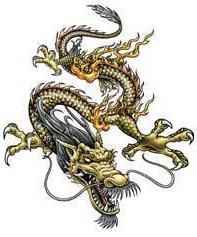
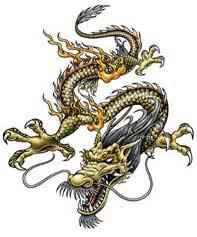
From The Glory and The Dream by William Manchester: Until Christmas they (the Japanese) could count on a trickle of petroleum from private sources, Anglo-American companies with storage tanks on neutral soil. But every day counted now. Konoye submitted his government's demands to Grew: if the United States would stop arming Chiang Kai-sheik, stop building new fortifications in the Pacific, and help the emperor's search for raw materials and markets, Konoye promised not to use Indochina as a base, to withdraw from China after the incident there had been 'settled, and to 'guarantee' the neutrality of the Philippines. Grew warned Washington that there were worse men around the throne than Konoye; humble him, and one of them would replace him.
Unimpressed, Hull sent back an ultimatum: Japan must withdrawal troops from China and Indochina, denounce the Tripartite Pact, and sign a non-aggression pact with neighboring countries. Hull seemed to feel that the United States could treat the Japanese in any way it chose. As far as politics was concerned, he could. If such an ultimatum had been sent to Berlin, there would have been America First rallies all over the country and impeachment proceedings on the Hill. But Grew had been right; Konoye stepped down on October 16 and was succeeded by General Hideki Tojo, the fiercest hawk in the Orient. The embargoed Japanese now believed that they had no choice. They had to go to war, unless they left China, which was unthinkable. They began sharpening samurai swords.
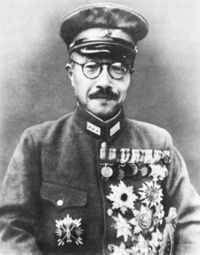
Army militant Tojo replaces Konoye as Japanese Prime Minister.
October 16, 1941: From the Diary of Rear Admiral Giichi Nakahara:
The Cabinet resigned en bloc this afternoon. Disagreement of policy. The United States demands that Japan evacuate all armed forces from China; unless Japan does this, adjustment of diplomatic negotiations between Japan and the United States will not improve. (However, the evacuation does not mean that the US accepts Japan's advance toward the Southern areas. What we aim at is to find improvement without evacuation. But the Army will not agree with this idea on the grounds that the unity of the Army cannot be preserved if this is put into practice. Konoye discussed with the Army with the view to withdraw the forces in China, as if to pay off by installments (to evacuate little by little surreptitiously), but this did not come to terms.
There are elements in the Army itself that insist on our evacuation or a peaceful solution. Those who insist upon withdrawal say that if everything will be settled wholly by Japan's evacuation, this will be the best policy. But no compromise could have been reached. At last Konoye has to determine by himself either peace or war. Konoye consulted with Kido, but nothing was resolved. Then the resignation. This is the hope of all. It was decided that the Navy Minister would be Admiral Toyoda. (Dillon)
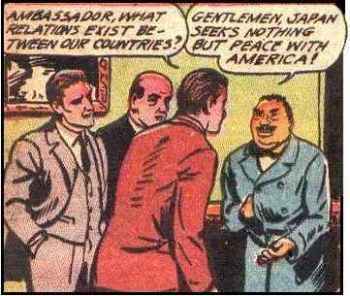
Tokyo (Toyoda) to Washington:
Although I have been requested by both the German and Italian Ambassadors in Tokyo to give to give them additional information on the Japanese-American negotiations, I have, in consideration of the nature of the negotiations, been declining
to do so... (Costello II)
Tokyo (Toyoda) to Washington:
The Imperial Government has repeatedly affirmed to the American Government that the aim of the Tripartite Pact is to contribute toward the prevention of a further extension of the European war. Should, however, the recent tension in the German-American relations suffer aggravation, there would arise a distinct danger of a war between the two powers, a state of affairs over which Japan, as a signatory to the Tripartite Pact, naturally cannot help entertain a deep concern. Accordingly, in its sincere desire that not only the German-American relations will cease further deterioration but the prevailing tension will also be alleviated as quickly as possible, the Japanese Government is now requesting the earnest consideration of the American Government. (Costello II)
October 16, 1941: Stimson's diary notes that this is a time of "diplomatic fencing" and that it is essential to "make sure that Japan was put into the wrong and made the first bad move.
October 16, 1941: Chief of Naval Operations to Commander-in-Chief Pacific Fleet:
Japanese Cabinet resignation creates a grave situation. If a new cabinet is formed it probably will be anti-American and strongly nationalistic. If the Konoye Cabinet remains it will operate under a new mandate which will not include rapprochement with the United States. Either way hostilities between Japan and Russia are strongly possible. Since Britain and the United States are held responsible by Japan for their present situation, there is also a possibility that Japan may attack these two powers. In view of these possibilities you will take due precautions, including such preparatory deployments as will not disclose strategic intention nor constitute provocative action against Japan.
October 16, 1941: The United States destroyer USS
Kearny, while escorting a convoy in the North Atlantic, drops depth charges after three merchant ships in her care are torpedoed. The
Kearny continues to search for the elusive U-boat all night.
October 17, 1941: In the wee hours, the
U-568 strikes the USS
Kearny on starboard side with a torpedo, killing 11 and wounding 22. The
Kearny will limp its way to Iceland for recovery by the 19th.
October 17, 1941: From the Duty Book of Captain Shigeshi Uchida:
General Tojo was ordered to form a new cabinet. As a result of the Nagato table maneuvers, Chief of Staff of the First Air Fleet went up to Tokyo and requested again that the whole strength of the First Air Fleet be used in the PH operation. Combined Fleet headquarters also requested to change the date of the Malaya landing. The idea of making a landing on Malaya on "X" day was not adequate, they asserted. As a result, the Naval General Staff made negotiations with the Army General Staff, but the latter did not consent. (Dillon)
October 17, 1941: From the Diary of Rear Admiral Giichi Nakahara:
According to the man on [sic] the street, the Premier will be either General Ugaki, Konoye or (Koki) Hirota, but they have strong and weak points, though they all are not militarily biased. Among those on the side of the Army, the candidates were Tojo, Terauchi, and Hata. Some say that to each of them a telegram has been dispatched already. Among those on the side of the Navy are Oikawa and Yagamoto, but the Navy will not send either one to the Cabinet. (Dillon)
October 17, 1941: Kimmel improves naval reconnaissance, but, recommends an insufficient number of planes; and not 360-degree, nor 24-hour patrols.
October 17, 1941: Army General Hideki Tojo takes control of the Cabinet (above), when he becomes both the Japanese Premier and the Minister of War.
October 18, 1941: Soviet Spy Richard Sorge is arrested in Tokyo.
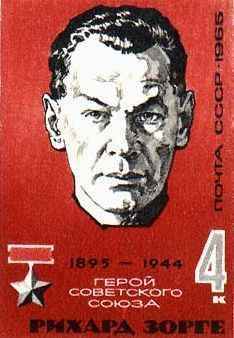
From The Unseen War, in Europe by J. H. Waller: One of the Soviet Union's most valuable secret agents in World War II was Richard Sorge operating in Tokyo. In recent times his memory has been resurrected as a Russian folk hero by a commemorative stamp bearing his dour face. Sorge, a German, was born in Russia but schooled in Berlin. He became a Soviet agent in 1925. Having arranged his own career as a correspondent for the Frankfurter Zeitung, he established an espionage organization in Tokyo.
Working in tandem with a brilliant Japanese journalist named Hotsumi Ozaki, he set about establishing a ring of spies whose tentacles reached deep into the Japanese government. Sorge also ingratiated himself with the German Embassy in Tokyo and in the mid-1930s became a trusted friend of German Military Attaché Eugen Ott, made ambassador in 1938, from whom he received valuable intelligence on German-Japanese developments. In April 1941 Ott told him in confidence that Germany had completed preparations to attack the USSR. This was electrifying information, which was confirmed by a German military visitor to Tokyo in May who explained in more detail Hitler's plans.
At about the same time Sorge learned the invasion date from another visiting German officer who had been introduced to him by Ott. June 20 was the date he gave although it actually took place two days later on June 22. It was most unlikely that Stalin would completely ignore Sorge's crucial reports. The stream of intelligence pointing to the likelihood of war between Germany and the Soviet Union was becoming a torrent.
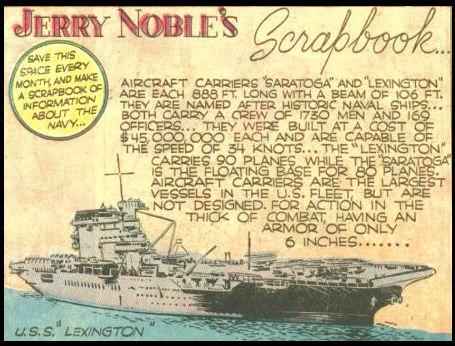
War Department to Hawaiian Department Commanding General:
Following War Department estimate of Japanese situation for your information. Tension between the United States and Japan remains strained but no, repeat no, abrupt change in Japanese foreign policy seems imminent.
October 20, 1941: Averell Harriman to Winston Churchill:
The interventionists have increased in number and are more confident and aggressive. Many of the less violent isolationists have become reconciled to the inevitability of war. Some of the more violent isolationists like Lindbergh have been discredited in the public eye. Others are running to cover. And yet, with all this trend, it is not at all clear what or when something will happen to kick us into it. The news on Saturday of the torpedoing of the Kearney did not cause even a ripple. It seems that the public had expected—and were thoroughly prepared for—such occurrences... (Harriman)
From The Blast of War: 1939-1945, by Harold Macmillan: All through the late summer and autumn months the anxieties of the British Government grew. Russia might be defeated, and Hitler free to turn again to the final assault upon Britain. Our Far East possessions were under dire threat from Japan. Yet we had no choice but to follow American policies. After all, we were largely dependant on their active assistance for continuing the war in Europe. We knew we had the sympathy of the President and those immediately around him. For Roosevelt had for many years been awake to the dangers of Hitler and his dreams. With consummate skill he had guided a Congress and people who were still isolationists by tradition.
He had persuaded them, step by step, to amend or allow him to disregard the neutrality legislation in Britain's favor. He had effected the exchange of the West Indian bases for the fifty destroyers—obsolescent, but essential to our needs. He had maintained guard over half the Atlantic against the German submarines. He had solved our pressing financial problems by the institution of Lend-Lease. Yet he was by no means all-powerful. Congress was still suspicious. There had been the greatest difficulty in carrying or renewing compulsory military service. Churchill therefore had to be careful. He must not appear to be trying to coax the Americans into war; for the most wounding accusation that could be made against an American politician was that he had been cajoled by the sly enticements of the subtle "Britishers."
October 21, 1941: From the Duty Book of Captain Shigeshi Uchida:
The NGS's orders and directives to be sent out prior to the outbreak of war were discussed and decided. They were all drafted by me. It is expected that we are going to war on 8 December. The operational plan of this coming war was completed. (Dillon)
October 21, 1941: From the Diary of Rear Admiral Giichi Nakahara:
INTERNAL CONDITIONS OF THE HOMELAND (REPORTED BY ITO) The Navy is now left behind and the general situation is that the tables were turned to our disadvantage. The Navy has to stand firm. MEETING OF THE CHIEFS OF THE BUREAUS AND DEPARTMENTS: Political Affairs—about the National policy that was decided on 3 September. Now the diplomatic relations with the United States are not turning out favorably to us or showing any sign of hope. On the other hand, there is an operational disadvantage. Here opinions disagree. Army 2,1000,000 + Navy 1,800,000 = 3,900,000—hypothesis is simply to employ them sometime during November. Preparation has begun concerning the employment of "Second to Finish." (Dillon)
October 22, 1941: Washington (Namura) to Tokyo:
I have already wired you something about my present psychology. I am sure that I, too, should go out with the former cabinet. I know that for some time the Secretary of State has known how sincere your humble servant is, yet how little influence I have in Japan. I am ashamed to say that it has come to my ears that this is the case. There are some Americans who trust this poor novice and who say that things will get better for me, but alas, their encouragement is not enough. Among my confreres here in the United States there are also some who feel the same way, but, alas, they are all poor deluded souls.
As for Your Excellency’s instructions, WAKASUGI can carry them out fully. Nor do I imagine that you all have any objections. I don’t want to be the bones of a dead horse. I don’t want to continue this hypocritical existence, deceiving other people. No, don’t think I am trying to flee the field of battle, but as a man of honor this is the only way open for me to tread. Please send me your permission to return to Japan. Most humbly do I beseech your forgiveness if I have injured your dignity and I prostrate myself before you in the depth of my rudeness. (Costello II)
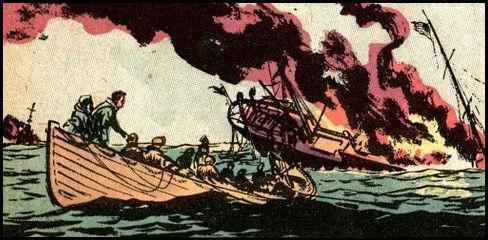
From the Diary of Rear Admiral Giichi Nakahara:
The United States destroyer Kearny was attacked by a German submarine near Iceland. The United States issued an order to arm merchant marine ships. Hereupon the United States and Germany have entered into war without a regular declaration of war between the two countries. But again on the 22nd two American ships (merchant marine) were sunk by attack on the Atlantic Ocean. With these the said two countries became belligerent states. (Dillon)
October 24, 1941: Admiral Yamamoto to (newly appointed) Navy Minister Shimada:
After much study, therefore, I have come to the opinion that the only way is to have a powerful air force strike deep at the enemy's heart at the very beginning of the war and thus deal a blow, material and moral, from which it will not be able to recover for some time. Judging from Admiral Kimmel's character and the recent trend of thought in the American Navy, it does not appear likely that the American Navy will necessarily confine itself to the strategy of a steady frontal offensive. And when I think what the strength of our homeland defense will be while the southern operations are in progress. I cannot but
be truly apprehensive... From the Diary of Rear Admiral Giichi Nakahara:
The United States has announced that the States has now 4 naval bases under construction in England. Again it is reported that another American merchant marine ship was sunk on the Atlantic by attack. The United States made it clear that to transport materials for aiding the USSR through Vladivostok would be stopped. (I wonder if it could be done through Archangel?) Moscow, Kharkov, and Rostov are facing a real crisis. (Dillon)
October 26, 1941: From the Diary of Rear Admiral Giichi Nakahara:
The United States Navy Department made a showdown that the transportation route of sending material for the aid of the Soviet was changed to Boston-Archangel course. Of course, this is the policy of giving offense to Japan as well as to deter Japan's good start together with the freezing of funds in the US. Notwithstanding, this will cause a tendency among the Japanese, giving them a sort of optimistic prospect of improving diplomatic relations between the US and Japan; consequently it is feared Japanese resolution may be weakened by such an opinion. The United States prefers to choose a chronic way of entering into the war; the bill of arming merchant marine ships passed the Lower House, and the bill permitting passage into the blockaded area.
In England, on the other hand, there are two elements disputing each other; one is that the British forces should land on the continent, and the other is to send needed materials to the Soviet Union, for the British Empire is not so strong as to be able to land on the Continent. Anyway, England is still agonizing how to help the USSR in this Russian crisis. Russia has promoted to use the forces in the Asiatic Far East. The crisis is so pressing. (Dillon)
October 28, 1941: From the Duty Book of Captain Shigeshi Uchida:
The national policy has not yet been decided. The Emperor ordered a study of the present situation from the very beginning, cleaning the slate. (The shipping problem was thought to be the most serious question at that time.) (Dillon)
October 31, 1941: The US destroyer, the
USS Reuben James, is torpedoed by German submarine
U-55, commanded by Kapitaenleutnant Erich Topp, near Iceland.
Reuben James had positioned herself in harm's way, between an ammunition ship in a British convoy and the known position of a "wolfpack" (a group of submarines hunting Allied shipping). Of the 159-man crew, only 44 survive. An undeclared war between Germany and the United States has existed since President Roosevelt authorized the use of American naval vessels to escort Lend-Lease convoys bound for Britain. This destroyer is the first US naval casualty .
November 1, 1941: The Japanese Combined Fleet changes its radio code.
November 1, 1941: From the Diary of Captain Shigeshi Uchida:
The Liaison Conference between the Cabinet and the High Command reached a conclusion to go to war with the US by 0100 on the 2nd. (Dillon)
November 2, 1941: From the Diary of Rear Admiral Giichi Nakahara:
The US is not yet so excited. The bill allowing US armed merchant ships to enter the blockaded areas of England should have been passed, yet the time is not ripe for that, because the armament is not sufficient. Since the change of the Japanese Cabinet, the Government has been considering the National policy, and it was recently decided that the Government will take positive steps in this situation. It came to this--that some changes of political idea is absolutely necessary from the standpoint of armament plans. (Dillon)
November 2, 1941: From the Duty Book of Captain Shigeshi Uchida:
It is said that the liaison conference between the Government and the High Command, after several days' discussions, by midnight of 1 November has reached the decision that Japan will go to war. On 28 and 29 October, the chief of the section and Comdr. Yamamoto went down to the flagship of the Combined Fleet off Saeki Bay to inform them of the NGS's orders and directives and operational principles, central agreement between the Army and the Navy. (Dillon)
November 3, 1941: Ambassador Grew in Japan to Secretary of State Hull:
An attempt to correct the error of 1940 may be found in the efforts to adjust Japanese relations with the United States and thereby to lead the way to conclusion of peace with China, made by Prince Konoye and promised by the Tojo Cabinet. If this attempt fails, and if success continues to favor German arms, a final, closer Axis alignment
may be expected... War Department to Hawaiian Department: Subject: Information Received from the Orient. Summary of Information:
The following information received from the Orient, dated August 26, 1941, is considered reliable: 1. Mr. HIROTA, a presiding officer at directors’ meeting of the Black Dragon Society, told of an order issued by War Minister TOJO (now Premier) "to complete full preparation to meet any emergency with the United States in the Pacific. All guns to be to be mounted in the islands of the Pacific under Japanese mandate. The full preparation to be completed by November." 2. HIROTA and others are said to have stated: "War with United States would best begin in December or in February." 3. "Very soon," they say, "the cabinet will be changed. The new Cabinet would likely start war within sixty days." G-2 Note: Full name of individual mentioned above is KOKI HIROTA, who is reported to be a member of the House of Peers, former Premier of Japan and director of the Bureau of Intelligence, US Section. (Costello II)
November 3–4, 1941: From the Diary of Rear Admiral Giichi Nakahara:
Commanders in Chief of the Combined Fleet and Naval Stations were summoned. Ambassador Kurusu left Japan for the United States by plane via Hong Kong and the Philippines.
November 5, 1941: Tokyo to Washington:
Because of various circumstances, it is absolutely necessary that all arrangements for the signing of this agreement be completed by the 25th of the month. I realize that this is a difficult order, but under the circumstances it is an unavoidable one. Please understand this thoroughly and tackle the problems of saving the Japanese-US relations from falling into chaotic condition. Do so with great determination and with unstinting effort, I beg of you. This information is to be kept strictly to yourself only. (Costello II)
November 8, 1941: From the Diary of Rear Admiral Giichi Nakahara:
Dispatch of Admiral Kurusu will not mean any break or development of the situation. Modified American Neutrality Act of the Sailing of the US Armed Merchant Marine Ships through Belligerent Areas--the bill passed the Upper House (Senate) of the United States. American forces in China will be repatriated, it was announced. (Dillon)
November 10, 1941: From the Diary of Captain Shigeshi Uchida:
At the Army General Staff, had a conference for table-top maneuvers in the presence of the Emperor and also had a preliminary exercise for it. (Dillon)
November 10, 1941: From the Diary of Rear Admiral Giichi Nakahara:
Against the sailing of American armed merchant marine ships through belligerent areas on the sea, Hitler announced that Germany issued (orders) to attack any of them found in those areas for the sake of Germany's self-defense. It is reported that some part of the German Forces are being sent back to Germany from the Soviet Union, for such damage has been inflicted upon Russia to the extent of Russia's not being able to stand up again for the time being. Which course will the new operation take? Another rumor runs that a new order to attack Moscow was issued. (Dillon)
From Truman, by David McCullough: The continued ranting of Adolf Hitler on the radio left him (Senator Harry Truman) increasingly gloomy. He met for lunch in Washington with Robert Danford, his old superior officer at Camp Doniphan, now a general, and talking of events in Europe and Germany's apparent military superiority, they both became "mighty blue." Harry feared a Nazi world. He dug out some of his old Army maps of France and tacked them to his office wall to follow the fighting. In open opposition to such strident isolationists in the Senate as Wheeler, Borah, and his fellow Missourian, Bennett Clark, he spoke out still more and more strongly for "preparedness," called on the President to summon a special session of Congress to revise the Neutrality Act of 1936, which he himself had voted for but now realized was a mistake.
In a speech in Missouri in October, he said the three dictators, Stalin, Hitler, and Mussolini, had reverted to the code of "cave-man savagery." American neutrality was obsolete in the face of such reality, he said. The arms embargo must be lifted. "I am of the opinion that we should not help the thugs among nations by refusing to sell arms to our friends." With Senator James Byrnes of South Carolina, he urged larger appropriations for defense, an immediate buildup of the Army, and a Navy "second to none." He was outraged by the arguments of the America First movement and the speeches made by Charles Lindbergh. On November 11, Armistice Day, he wrote to Bess: "You know, it makes some of us who went on that first Crusade...wonder sometimes just what fate really holds for civilization."
November 11, 1941: From the Diary of Rear Admiral Giichi Nakahara:
Meeting concerning the reconstruction of armament. According to this, building of big ships will be stopped and in its stead concentration will be put upon building aircraft and submarines. Concerning the aircraft, the 5th Plan will be put into effect immediately. Concerning the submarines, a total of 107 vessels (including 32 vessels as an addition) will be built by March 1944; during the...years between March 1944 and March 1946 another 160 vessels will be built. (Dillon)
November 11, 1941: From a speech by Secretary of the Navy Knox:
...My friends, we meet here in the presence of grave dangers. It is impossible to overemphasize them or exaggerate them. We are not only confronted with the necessity of extreme measures of self-defense in the Atlantic, but we are likewise faced with grim possibilities on the other side of the world—on the far side of the Pacific. Just what the morrow may hold for us in that quarter of the globe, no one may say with certainty. The only thing we can be sure of is that the Pacific, no less than the Atlantic, calls for instant readiness for defense. In the Pacific area, no less than in Europe, interests which are vital to our national security
are seriously threatened... The FBI arrest 15 Japanese American businessmen and community leaders in Los Angeles' Little Tokyo. All those arrested cooperate fully, and a spokesman for the Central Japanese Association proclaims: "We teach the fundamental principles of America and the high ideals of American democracy. We want to live here in peace and harmony. Our people are 100% loyal to America." (Niiya)
November 13, 1941: Friedrich Guggenberger's
U-81 torpedoes the aircraft carrier HMS
Ark Royal. The carrier sinks the next day with only one fatality
November 13, 1941: From the Diary of Rear Admiral Giichi Nakahara:
Interview of Ambassador (Kurusu) has been postponed day by day. (FN: Actually Kurusu did not reach Washington until 15 November.) Thailand could not keep her neutrality and people are crying for their firm stand. (Dillon)
November 14, 1941: Tokyo to Hong Kong:
Though the Imperial Government hopes for great things from the Japan-American negotiations, they do not permit optimism for the future. Should the negotiations collapse, the international situation in which the Empire will find herself will be one
of tremendous crisis... (Costello II)
From the Diary of Rear Admiral Giichi Nakahara:
...Strict keeping of the Navy secret—to contrive so as not to leak it before the investigation for the sake of full armament, especially to those who are not related to the affairs... (Dillon)
November 15, 1941: Tokyo (Togo) to Washington (Riyoji):
As relations between Japan and the United States are most critical, make your "ships in harbor report" irregular, but at a rate of twice a week. Although you already are no doubt aware, please take extra care to maintain secrecy. (Costello II)
November 15, 1941: From the Diary of Lieutenant Commander Sadao Chigusa (the Chief Ordinance Officer and Executive Officer of the Japanese destroyer
Akigumo):
Fine weather on a clear autumn day. My parents came to the Furuichi-bashi Station of a local train line to see me off. I parted from my father and mother with lingering steps, feeling secretly that this might be the last farewell to my parents. On the other hand, my parents should have decided in their own minds to let me join in battle sooner or later...
1735: At last the Akigumo left Kure Base for Saki Bay. When we passed Ujina Port at the southern extremity of Hiroshima City, I looked over the misty sky toward my home and sank into deep thoughts of my parents. I was temporarily overcome with homesickness. I soon became absorbed in fire training against airplanes, after receiving the order "Take Stations!" We performed a speed trial at 14 kts at night by illuminating the shore mile post when we passed off Okurokami Island, located to the southwest of Miyajima Island. (Later I learned that this speed of 14 kts was the speed we would hold all the way to Pearl Harbor.).
November 16, 1941: From the Diary of Lieutenant Commander Chigusa (XO of the destroyer
Akigumo:
0230. In a calm and still dark night the Akigumo dropped anchor at her berth at Saeki Bay in Gita Prefecture. At dawn it was fine weather on a clear autumn day with no wind. I felt that the panoramic view of the Fleet which had now gathered here since last evening spread before my eyes was really heroic and even beautiful. Morning: I made a report of the first step in the preparation for war as we had done at Kure Base.
1215. All crew gathered on the forward deck on order, and received the following address and instructions from the Commanding Officer, Commander Terumichi Arimoto, which touched our hearts: "Please do your best to do your duties well, as we go forward to Hitokappu Bay by squadrons. War clouds are quickly gathering."
1300. A meeting for the chief ordinance officers of all the destroyers under the auspices of Lt. Cmdr. Mikami, who was the ordinance staff officer of the Torpedo Squadron on board the cruiser Abukuma, our flagship. I now made up my mind to be able to cope with whatever challenges the battle would have. In the evening we had training in antiaircraft fire and finished it very smoothly as our training progressed.

Half of Japan's fleet of 64
submarines, the slowest moving of the military units needed on the scene for the attack on Pearl Harbor, depart Kwajalein.
November 16, 1941: Tokyo to Washington:
…you may be sure that you have all my gratitude for the effort you have put forth, but the fate of our Empire hangs by the slender thread of a few days, so please fight harder than you ever did before. .... In your opinion we ought to wait and see what turn the war takes and remain patient. However, I am awfully sorry to say that the situation renders this out of the question. I set the deadline (November 25, 1941) for the solution of these negotiations…and there will be no change. Please try to understand that. You see how short time is; therefore do not allow the United States to sidetrack us and delay the negotiations any further. Press them for a solution on the basis of our proposals, and do your best to bring about an immediate solution. (Costello II)
November 16, 1941: The US Navy loses track of all the Japanese carriers.
November 17, 1941: Japanese Foreign Minister Togo addresses the Imperial Diet:
Since the outbreak of the China affair Japanese-American relations have progressively deteriorated, steadily gathering force, so that if they were left to drift without timely check there was no knowing whether the situation would not ultimately
end in catastrophe... From the Diary of Lieutenant Commander Chigusa (XO of the destroyer
Akigumo:
0200. All ships of the Fleet began to weigh anchor and left Sacki Bay in high spirits in a chilly wind. The Akigumo left the Bay as rear guard of the destroyer squadron.
0700. We had our first training ball firing against aircraft off Ashizuri Point in Shikoku Island. I have been nervously anticipating the firing, because I had had only two experiences in live firing since the Akigumo had been commissioned the previous September.
November 17, 1941: From the Diary of Rear Admiral Giichi Nakahara:
The President of the US signed (the bill) to arm US merchant marine ships and the plan of escorting British ships. It was decided that the United States will rent bases on the Atlantic to England. (Dillon)
November 17, 1941: Admiral Yamamoto addresses officers of the task force aboard his flagship, the carrier
Akagi:
Our opponent this time is not an easy one. She is of a much higher rating than the enemies Japan has fought until today, and is a much stronger enemy. The enemy lacks nothing. Admiral Kimmel, himself a young man, is said to have gone up to be commander in chief by his ability. He is a man with much courage and "guts." The success or failure of the operation of the mobilized unit taking the first step in this battle will influence the success or failure of the entire operation. I'm praying for the best effort from all of us and for our success. (The various units that will be involved in the attack now get underway (in succession) for Hitokappa Bay, where the task force will assemble.) (Dillon)
November 18, 1941: From a memorandum regarding a conversation between Secretary of State Hull with Japanese Ambassador Nomura and Mr. Kurusu:
The Secretary cited the instance when Germany, after having concluded an anti-Comintern pact with Japan had surprised Japan later on by entering into a non-aggression pact with Russia and finally went back on the non-aggression pact by attacking Russia. The Secretary said that he presumed Japan did not know in advance what Germany's intentions were any more than we did. The Secretary expressed great doubt that any agreement into which we entered with Japan while Japan at the same time had an
alliance with Hitler... From the Diary of Lieutenant Commander Chigusa (X0 of the destroyer
Akigumo):
Morning. We finished our training for oil supply smoothly. About Noon. To our left we watched Hachijojima and Miyakejima Islands go out of sight. We were reluctant to part from our islands. It is warm from a south wind. 1700. Our course is changed north to 50 degrees. The oil supply training scheduled at night is cancelled, because it took a long time to supply one of the other ships.
November 18, 1941: Honolulu (Kita) to Tokyo:
1. The warships in Harbor on the 15th…
Area A—A battleship of the Oklahoma class entered and one tanker left port.
Area C—3 warships of the heavy cruiser type were at anchor.
2. On the 17th the Saratoga was not in the harbor. The carrier, Enterprise, or some other vessel was in Area C. Two heavy cruisers of the Chicago class, one of the Pensacola class were tied up at docks "KS". 4 merchant vessels were at anchor in Area D.
3. At 10:00 AM on the morning of the 17th, 8 destroyers were observed entering the Harbor. Their course was as follows: In a single file at a distance of 1,000 meters apart at a speed of 3 knots per hour, they moved into Pearl Harbor. From the entrance of the Harbor though Area B to the buoys in Area C, to which they were moored, they changed course 5 times each time roughly 30 degrees. The elapsed time was one hour, however, one of these destroyers entered Area A after passing the water reservoir on the Eastern side. (Costello II)
The New Age of Franklin Roosevelt, by Dexter Perkins: It is fair to say, therefore, that the situation had reached an impasse by the autumn of 1941. It was aggravated still more by the fall of Prince Konoye in October. Even then, strong elements in Japan wished to avoid a break, and Admiral Tojo, who took Konoye's place as premier, seemed to show some willingness to continue negotiations. But the new cabinet lost little time in accelerating the preparations for war, and the conversations between the Secretary of State and the Japanese ambassador, Admiral Namura, accomplished nothing. Nonetheless, it must again be emphasized that the Roosevelt administration by no means desired to force things to a conclusion.
On the contrary, a memorandum of the President (written about November 17) evinced a desire to resume commercial relations in some degree if the Japanese would send no more troops to the south and would agree not to be bound by the tripartite pact. Furthermore, a week or so later the State Department produced proposals that later became famous as the last effort to avert a clash. These proposals asked the Japanese to withdraw from southern Indo-China and to limit their forces in the northern part of the country. In exchange the United States would agree to lift restrictions freezing Japanese assets in America, and exports would be resumed subject to the control measures made necessary in the national defense.
The proposal caused a howl of anguish from the Chinese, won little enthusiasm from the British, and met with a frigid reception from many circles in the United States. Secretary Hull soon dropped it in disgust. Though his action has since been the subject of harsh criticism, there seems little reason to believe that in any case it would have been acceptable to the Japanese. At the very same time that it was under discussion, the Japanese squadrons were already sailing eastward to the attack on Pearl Harbor.
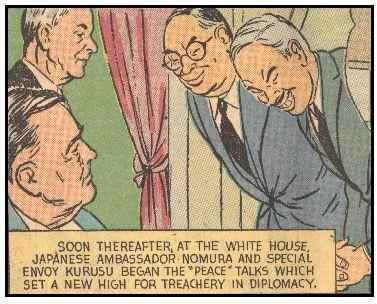
Tokyo to Washington:
The condition outlined by them namely "After the peaceful policy’s of Japan have been made more definite" we imagine would naturally have reference to the question of the three-power treaty. It does not mean merely that Japan will withdraw her troops from Southern Indo-China, and that then the US will go back to conditions prior to the freezing act. It leaves the way open for the US to bring up rather complicated terms. On the other hand, the internal situation in our country is such that it would be difficult for us to handle it if we withdraw from Southern Indo-China, merely on assurances that conditions prior to the freezing act will be restored. It would be necessary to have a proposed solution that would come up to the B proposal.
With the situation as urgent as it is now, it is of utmost importance that you play your hand for the amelioration of the situation, to the extent of the proposal in your message, then to push on for an understanding. The Ambassador did not arrange this with us beforehand, but made the proposal contained in your message for the purpose of meeting the tense situation existing within the nation, but this can only result in delay and failure in the negotiations. The Ambassador, therefore, having received our revised instructions…will please present our B proposal of the Imperial Government, and no further concessions can be made. If the US consent to this cannot be secured, the negotiations will have to be broken off; therefore, with the above well in mind put forth your very best efforts. (Costello II)
November 19, 1941: From the Diary of Lieutenant Commander Chigusa (X0 of the destroyer
Akigumo):
0800. The alarm for General Quarters suddenly rang through the ship. All the crew went to their combat stations. A composite assault exercise by our Torpedo Squadron is launched against the group of tankers as targets.
0900. As soon as we finished our assault exercise, we had oil supply training using the "astern" method with the Nippon Maru...The Akigumo's location at noon was 100 miles east of Tokyo. Just past noon the wind changed to the north and the temperature fell gradually. I began to feel cold. We changed our course to 20 degrees and were headed straight for Hitokappu Bay.
Afternoon. We instituted protection against the cold. High waves at night. The wind is blowing at over 10 meters a second (20 kts). I dug out a heavy coat to wear and lost no time in putting on both a muffler and a woolen jacket which my wife, Fumiko, mailed to me to help against the cold weather we anticipated.
November 20, 1941: Berlin to Tokyo
:
I received a visit from the Thai Minister on the 20th. He opened his remarks by saying that he was also a soldier and would like to have a frank talk with me as between men who had know each other for many years. He then referred to a recent crop of rumors to the effect that JAPAN was to invade THAILAND, and to reports of large Japanese troop concentrations on the Thai frontier of French Indo-China, and asked point blank whether there was any truth in them or not. I replied that I had no news from my home Government
on these matters... (Costello II)
From the Diary of Lieutenant Commander Chigusa (X0 of the destroyer
Akigumo):
0800. On the order "General Quarters" all the crew quickly took combat stations. We again had a composite assault exercise against the tanker groups as our targets. I made every effort to do fire training during this exercise. The temperature went down to 8 C. (46 F.). The wind is now weak and the sea calm. As our ship goes further north, the temperature falls minute by minute.
0930. We had oil supply training. Afternoon. Ammunition supply training was held which included paymasters and hospital orderlies.
1830. We had night oil supply training. As training advances, oil supply is done smoothly step by step. There is an especially biting cold at night, so I take my night duty on the bridge wearing two pair of socks, one of which was a heavy white wool pair made by my wife, which I wore over the other.
November 20, 1941: Japanese Ambassador Nomura hands a
Draft Proposal to Secretary of State Hull.
November 20, 1941: From a memorandum regarding a conversation between Secretary of State Hull with Japanese Ambassador Nomura and Mr. Kurusu:
The Secretary asked what the Ambassador thought would be the public reaction in this country if we were to announce tomorrow that we had decided to discontinue aid to Great Britain. He said that in the minds of the American people the purposes underlying our aid to China were the same as the purposes underlying aid to Great Britain; that the American people believed that there was a partnership between Hitler and Japan aimed at enabling Hitler to take charge of one-half of the world and Japan of the other half; and that the fact of the Tripartite Alliance and the continual harping by Japanese leaders upon slogans of the Nazi type such as "new order in East Asia" and "co-prosperity sphere" served to strengthen the public in their belief. What was therefore needed, the Secretary pointed out, was the manifestation by Japan of a clear purpose to pursue peaceful courses. The Ambassador replied that there was no doubt of Japan's
desire for peace... Navy Directive No. 5:
Directive to: Yamamoto, C in C, Combined Fleet 1. The Commander-in-Chief of the Combined Fleet will immediately assemble and call back the operational units if the Japanese-American negotiation is successful... (Dillon)
November 21, 1941: From the Diary of Lieutenant Commander Chigusa (X0 of the destroyer
Akigumo):
Morning. We had trial firing for four light machine guns (MK 96), but the movement was not good due to congealing of lubricant. This might be caused by the low temperature which suddenly fell to 4 C (39 F). I barely finished my firing by using a special cold resistant oil. I had an experience that taught me that normal oil should be prohibited in extremely cold areas...
1420. A second live firing practice against aircraft was held. The Akigumo and the target plane are passing each other, so the target is approaching us rapidly. I smoothly shot two live shells from each gun with alternate firing method. At last I gained confidence in firing myself.
1535. My ship, Akigumo, at last dropped anchor at Hitokappu Bay. I gave a sigh of relief to safely reach the last meeting place of the Task Force. ....
I also felt refreshed after being able to shave my face, as this was the first chance to do so since our departure from Saeki Bay. On the other hand, turning my eyes to the surface of Hitokappu Bay, it is really encouraging to see all the ships of our Task Force steam in one after another and gather in full force by evening. It is a high-spirited group dominating the northern sea with these crack ships of the Imperial Navy.
November 22, 1941: Tokyo to Washington:
To both you Ambassadors (Nomura, Kurusu). It is awfully hard for us to consider changing the date we set…(November 25, 1941)…You should know this, however, I know you are working hard. Stick to our fixed policy and do your very best. Spare no efforts and try to bring about the solution we desire. There are reasons beyond your ability to guess why we wanted to settle Japanese-American relations by the 25th, but if within the next three or four days you can finish your conversations with the Americans; if the signing can be completed by the 29th (let me write it out for you—twenty-ninth); if pertinent notes can be exchanged; if we can get an understanding with Great Britain and the Netherlands; and in short if everything can be finished, we have decided to wait until that date. This time we mean it, that deadline absolutely cannot be changed. After that things are automatically going to happen. Please take this into your careful consideration and work harder than you ever have before. This, for the present, is for the information of you two Ambassadors alone. (Costello II)
November 22, 1941: From a memorandum regarding a conversation between Secretary Of State Hull, Japanese Ambassador Nomura, and Mr. Kurusu:
The Ambassador said he did not have the slightest doubt that Japan desired peace. He then cited the popular agitation in Japan following the conclusion of the peace settlement with Russia in 1905 as pointing to a difficulty in the way of publicly backing
a conciliatory course... From the Diary of Lieutenant Commander Chigusa (X0 of the destroyer
Akigumo):
Afternoon. We had oil supply to fill our tanks while at anchor by coming alongside the tanker Toho Maru today. After supply Commander Arimoto, our commanding officer, explained (to the staff officers) the great operational plan for the battle against the USA, and I made up my mind that "An opportunity certainly offers itself." When I lost myself in thought at that time, the Hawaiian Battle gave me some sad thoughts because this battle would attack Hawaii where my elder brother was hen living (an American citizen employed in a Honolulu hotel). But I would surely fight as well as I could without any change of my mind, forgetting my thoughts of my brother, because this battle would be for my Emperor and my country. We were permitted to drink sake and also to have amusements for all the crew. All the sailors really indulged in these final pleasures in their confined rooms aboard the ship which was now rolling in the long swells coming from the mouth of the Bay...
2200. I patrolled throughout the ship to see that the sailors were sleeping. I found a few of the sailors talking a lot of hot air under the influence of sake, and I rebuked them, telling them to go to their beds. Today all the crew were pleased to be told that our bonuses for the trip would be 200% of each salary (two months pay).
2300. I went to bed after my last security patrol. Very cold.
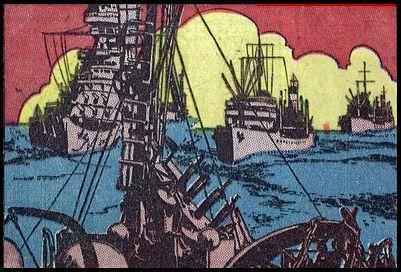
From Carrier Striking Task Force Operations Order No. 1:
To Carrier Striking Task Force 1. The Carrier Striking Task Force will proceed to the Hawaiian Area with utmost secrecy and, at the outset of the war, will launch a resolute surprise attack on and deal a fatal blow to the enemy fleet in the Hawaiian Area. The initial air attack is scheduled at 0330 hours, X Day. Upon completion of the air attacks, the Task Force
will immediately withdraw... (Dillon)
From the Diary of Lieutenant Commander Chigusa (X0 of the destroyer
Akigumo):
In the morning after the Commanding Officer gave his instruction for the coming battle (informing the ships company officially of their mission), I minutely explained the matters for this operation that demanded the special attention of all the crew....
November 24, 1941: Chief of Naval Operations to Commander in Chief Pacific Fleet:
There are very doubtful chances of a favorable outcome of negotiations with Japan. This situation coupled with statements of Nippon Government and movements of their navel and military forces indicate in our opinion that a surprise aggressive movement in any direction including an attack on the Philippines or Guam is a possibility. The Chief of Staff has seen this dispatch and concurs…Utmost secrecy is necessary in order not to complicate an already tense situation or precipitate Jap action…
November 24, 1941: From the Diary of Lieutenant Commander Chigusa (X0 of the destroyer
Akigumo):
We had been alert all day long today, as the Akigumo was the watch ship to keep a lookout for the enemy's airplanes from morning till night as the final duty ship at Hitokappu Bay. It was very cold, so I prepared more protection against the cold by putting floss silk inside my socks and wearing the vest made by my mother. Tomorrow morning at last we will sortie for Pearl Harbor. I entrusted our final letters gathered from all the crew to the Toyomitsu Maru, a special provisions ship that will remain at Hitokappu Bay until the attack on Pearl Harbor. Among the letters from the crew were two letters of my own for my wife, Fumiko, and my parents. All the crew were pleased to have warm noodles at their midnight supper. I had nothing to look back on with regret, because we had enough study and discussion of this campaign today. The war preperations of my ship was completed, and moreover I had left my will for my wife and parents.
What might you think is for the Japanese a very important and traditional thing in war which I secretly took out of my drawer last night? It was a stomach band of Senninbari which my mother had elaborately made for me. Expressing my last gratitude for my mother's affection, I wound it tightly around my body. And I strongly made a fresh determination not to fall short of the expectations and the prayers of many people, one thousand of whom I didn't even know as faces, but they had kindly given one stitch to my Senninbari. Therefore, the real preperations had now been finished, and at 2230 I took my last sleep at Hitokappu Bay without any anxiety.
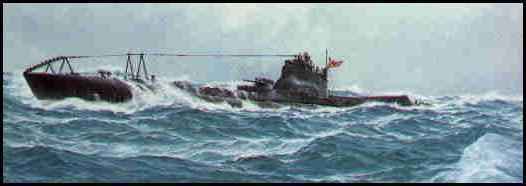
From the Duty Book of Captain Shigeshi Uchida:
3rd Submarine Squadron left the Marshall Islands for Hawaii. (Dillon)
November 25, 1941: From the Diary of Captain Shigeshi Uchida:
From today all operational forces are to leave for the designated stand-by points. We, too, are kept on the strain. (Dillon)
November 25, 1941: Hans Dietrich Freiherr von Tiesenhausen's
U-331 sinks the battleship HMS
Barham.
November 25, 1941: From the Diary of Lieutenant Commander Chigusa (X0 of the destroyer
Akigumo):
We were in a raging snow storm when we woke up this morning, and I felt the biting cold and the strain of our determined sally. 0600. At last we left Hitokappu Bay for Hawaii to attack Pearl Harbor, seeing Mt. Berumarube disappear behind us.
0630. On passing the mouth of the Bay, trial firing of a shell at [sic] the right gun of No. I turret was made toward a cliff, and the results were very good. The shell exploded on the target, emitting volumes of dreadful brown smoke, making a roaring sound. As a result of this firing, I found no problems in our procedures and gained confidence in myself as Chief Ordinance Officer. A northwest wind of 5-6 m/second (10–12 kts) blew, and it was very cold with occasional gusts of driving snow. A big roll of 20 degrees to each side continued due to large swells on the rough sea. But the Akigumo continued to head east at a smart speed of 14 kts. A sally of our great fleet was really a majestic sight. It was no wonder, however, since it was composed of the first-line ships of the Imperial Navy, all especially selected for this crucial mission.
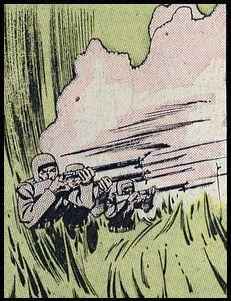
The German Wehrmacht's final drive on Moscow, Operation Typhoon, begins. (Clark II)
November 25, 1941: Stimson's diary notes that: "the question was how we should maneuver them into the position of firing the first shot without too much danger to ourselves."
November 26, 1941: From the Diary of Captain Shigeshi Uchida:
Miwa, a staff officer of the Combined Fleet, came up to confer with us. He came to tell us that the Combined Fleet saw no need of changing a plan of the battleship group which the NGS thought should be reconsidered in view of keeping alert against the British Fleet. (Dillon)
November 26, 1941: From the Diary of Lieutenant Commander Chigusa (X0 of the destroyer
Akigumo):
0500. The Akigumo was supplied 399 tons of oil from Toho Maru by the "alongside" method. It took about 45 minutes for the operation. I felt concern often during the oil supply operation because of the large waves and a 5–7 m (10–14 kts) northwest wind. Today we have very fine weather, but still encounter large swells. The maximum roll is 30 degrees to each side. Our midnight supper was Shiruko, which is a soup of sweetened bean jelly. We served it before our supper, because preparation for supper was delayed this evening.
November 26, 1941: Washington to Tokyo:
...if we let the situation remain tense as it is now, sorry as we are to say so, the negotiations will inevitably be ruptured, if indeed they may not already be called so. Our failure and
humiliation are complete... (Costello II)
From the Diary of Commander Sadamu Sanagi, a member of the Operations Section of the Naval General Staff:
At 0600 the Task Force secretly left Hitokappu Bay. In the Operations Room the weather chart covering the Pacific, including the Far East and America, was hung on the wall, and twice daily aerologists from the Hydrographic Office were to be in the room to study weather conditions for the Task Force, to which necessary weather information was to be sent. From today on, a duty staff officer was to remain in the Operation Room all day long, and half of the staff officers of the First Section were to stay in the Suikosha (Navy Club) at night. (Dillon)
November 26, 1941: Washington (Namura) to Tokyo:
The United States is using the excuse that she is at present negotiating with the various competent countries. In view of the fact that she will propagandize that we are continuing these negotiations only with the view of preparing for our expected moves, should we, during the course of these conversations, deliberately enter into our scheduled operations, there is a great danger that the responsibility for the rupture of negotiations will be
cast upon us... (Costello II)
From a memorandum regarding a conversation between Secretary Of State Hull, Japanese Ambassador Nomura, and Mr. Kurusu:
The Ambassador then asked whether there was no other possibility and whether they could not see the President. The Secretary replied that he had no doubt that the President would be glad to see them at any time. Mr. Kurusu said that he felt that our
response to their proposal could be interpreted as tantamount to
meaning the end... From the Duty Book of Captain Shigeshi Uchida:
The Task Force centering around the First Air Fleet left Hitokappu Bay heading for Hawaii. (Dillon)
November 26, 1941: Nagumo's First Air Fleet leaves Kuriles with 6 carriers, 423 planes, 2 battleships, 28 subs, 2 cruisers, and 11 destroyers.
November 27, 1941: From the Diary of Lieutenant Commander Chigusa (X0 of the destroyer
Akigumo):
I fell like all we do is eat meals, because lunch and supper is the only time we look at the clock. We received the following information from Imperial Headquarters as we more carefully continued our course toward the east under the intense attention of the watch officers and sailors on the bridge: "Two Soviet merchant ships left the west coast of the USA and are taking a course in the Northern Pacific toward the west on the 12th and 13th of this month. You might have an opportunity to meet them today or tomorrow." Our midnight supper was coffee and cakes.
November 27, 1941: From the Diary of Rear Admiral Giichi Nakahara:
German troops have neared 30 kilometers from Moscow. A German submarine sank the British cruiser Condi. The President of the United States went on a trip for his recreation when an important conference of the regular month-end one (was scheduled?). (Dillon)
November 27, 1941: From a memorandum regarding a conversation between President Roosevelt, Japanese Ambassador Nomura, and Mr. Kurusu:
The President then made the following points... ...We remain convinced that Japan's own best interests will not be served by following Hitlerism and courses of aggression, and that Japan's own best interests lie along the courses which we have outlined in the current conversations. If, however, Japan should unfortunately decide to follow Hitlerism and courses of aggression, we are convinced beyond any shadow of doubt that Japan will be
the ultimate loser... War Department to Hawaiian Department Commanding General:
Negotiations with Japanese appear to be terminated to all practical purposes with only the barest possibilities that the Japanese Government might come back and offer to continue. Japanese future action unpredictable but hostile action possible at any moment. If hostilities cannot, repeat cannot, be avoided, United States desires that Japan commit the first overt act. This policy should not, repeat not, be construed as restricting you to a course of action that might jeopardize your defense.
Prior to hostile Japanese action, you are directed to undertake such reconnaissance and other measures as you deem necessary but these measures should be carried out so as not, repeat not, to alarm the civilian population or disclose intent. Report measures taken. Should hostilities occur you will carry out the tasks assigned in Rainbow 5 as far as they pertain to Japan. Limit dissemination of this highly secret information to minimum essential officers.
November 27, 1941: From the Diary of Commander Sadamu Sanagi:
The press reported that the United States delivered a message to our side yesterday. A low pressure area which has hung over the Task Force is rapidly moving to the north; fine weather seems likely to continue for a few days. (Dillon)
November 27, 1941: G-2 War Department to G-2 Hawaiian Department:
Advise only the Commanding Officer and the Chief of Staff that it appears that the conference with the Japanese has ended in an apparent deadlock. Acts of sabotage and espionage probable. Also possible that hostilities may begin.
November 27, 1941: Cincaf and Cincpac:
This dispatch is to be considered a war warning. Negotiations with Japan looking toward stabilization of conditions in the Pacific have ceased and an aggressive move by Japan is expected within the next few days. The number and equipment of Jap troops and the organization of naval task forces indicates an amphibious expedition against either the Philippines or the Kra Peninsula or possibly Borneo. Execute an appropriate defensive deployment.
November 28, 1941: Tokyo to Washington:
Well, you two Ambassadors have exerted superhuman efforts but, in spite of this, the United States has gone ahead and presented this humiliating proposal. This was quite unexpected and extremely regrettable. The Imperial Government can by means use it as a basis for negotiations. Therefore, with a report of the views of the Imperial Government on this American proposal which I will send you in two or three days, the negotiations will be de facto ruptured. This is inevitable.
However, I do not wish you to give the impression that the negotiations are broken off. Merely say to them that you are awaiting instructions and that, although the opinions of your government are not yet clear to you, to your own way of thinking the Imperial Government has always made just claims and has borne great sacrifices for the sake of peace in the Pacific. Say that we have always demonstrated a long-suffering and conciliatory attitude, but that, on the other hand, the United States has been unbending, making it impossible for Japan to establish negotiations. Since things have come to this pass, I contacted the man you told me to…and he said that under present circumstances what you suggest is entirely unsuitable. From now on do the best you can. (Costello II)
November 28, 1941: From the Diary of Lieutenant Commander Chigusa (X0 of the destroyer
Akigumo):
Swells became calm as we steamed east on a comparatively calm sea with small rolls of 10 degrees to each side. This morning we received oil from the Toho Maru by the "astern" method. Beyond our expectations, we finished the operation without the least difficulty. We received news of the breakdown of diplomatic negotiations with the USA as well as information that British battleships were loitering about the Indian Ocean. We were now occasionally caught in a dense fog peculiar to the north Pacific Ocean. I shaved for the first time in 5 days.
November 28, 1941: From the Diary of Rear Admiral Giichi Nakahara:
German troops have approached within 26 kilometers from Moscow. A British destroyer, one vessel, was sunk by a German submarine. The United States returned an answer, on record, denouncing the Japanese demands. (Dillon)
November 28, 1941: US War Department Adjutant General to Hawaiian Department Commanding General:
Critical situation demands that all precautions be taken immediately against subversive activities within field of investigative responsibility of War Department. .... Also desired that you initiate forthwith all additional measures necessary to provide for protection of your establishments, property, and equipment against sabotage, protection of your personnel against subversive propaganda and protection of all activities against espionage. This does not, repeat not, mean that any illegal measures are authorized. Protective measures should be confined to those essential to security, avoiding unnecessary publicity and alarm….this does not, repeat not, affect your responsibility under existing instructions.
November 28, 1941: Admiral Kimmel sends Rear Admiral William Halsey's USS
Enterprise to deliver Marine Corps fighter planes to Wake Island.
November 29, 1941: From the Diary of Commander Sadamu Sanagi:
The enclosed orders (only to be opened by another order) of the Imperial General Headquarters Order directing the date of opening the war were delivered to representatives of all Naval Stations and Minor Naval Stations. (Dillon)
November 29, 1941: From the Diary of Lieutenant Commander Chigusa (X0 of the destroyer
Akigumo):
At last we spend the last day of November today. Owing to a dense fog last night, we were continuously alert all night to the safety of our navigation. We kept sharp watch with our searchlight playing as well as posting a bright shop lamp to warn any ship approaching too closely. ....
Since leaving Hitokappu Bay, we were continuously strained and tested by nature which confronted us with such obstacles as severe cold, big rolls and dense fog like last night. As day dawned, the fog gradually cleared. A south wind blows at 12-13 m (24-26 kts), but waves are rough and high. Our ship is rolling at 15 degrees to each side which continues all day long. Today, when oil was being supplied by the "astern" method from the Toho Maru, the mooring rope between the ships parted due to severe rolling. On this occasion I was operating the ship. It was an immense relief to find no one injured, as I stood drenched with the cold sweat of embarrassment. I tried again to receive oil by putting us in tow, but we were compelled to stop the operation owing to darkness when the work became too difficult. I felt stuffy and found I was affected by a cold, in spite of being armed with an outfit protecting me from the cold. When I used a Kairo (pocket warmer) sent to me by my wife directly to my abdomen I felt very hot, and at the same time became aware of being slightly burnt. Coffee with sweat bread, especially made by our cooks, was served for midnight supper. ....
I was very sorry that something concerned the Commanding Officer today and I think this might be due to the failure of our oil supply to be on schedule. I went to bed suffering, feeling that the responsibility lies with me. Our Task Force is silently continuing eastward at 14 kts. The Akigumo received an order to escort the Toho Maru and devoted herself to guarding the tanker all night.
November 29, 1941: Berlin to Tokyo:
...he (Ribbentrop) insisted that, as the Fuehrer had said that day, the existence of JAPAN and GERMANY on the one hand and AMERICA on the other was fundamentally incompatible, and the Germans were in receipt of reports that, owing to the stiff attitude of the Americans, there was practically no possibility of the Japanese-American negotiations being successful. If this was so, and if JAPAN determined on war against BRITAIN and AMERICA, not only would this be to the common advantage of JAPAN and GERMANY, but he believed it would be to JAPAN’s advantage also. I said I know nothing of JAPAN’s plans and therefore could not answer, but I asked whether His Excellency really thought a state of war would arise between GERMANY and AMERICA. He replied that Roosevelt was diseased, and there was no knowing what
he would do... From Ribbentrop's testimony before the IMT (after being confronted with the above document): I do not know this document, nor do I know where it comes from. At any rate, under no circumstances did I express it that way; and I regret that all the other documents which prove that I tried again and again to keep the United States out of the war, have not yet been read here. I have seen this document here and I have been pondering all the time as to how this passage would have gotten into the document. All the other documents, I believe a dozen or a dozen and a half, which have been presented here prove clearly my wish to keep America out of the war. I can prove that for years I had made efforts in all fields, despite the intransigent attitude of the United States, not to undertake anything against America.
I can explain this only as follows: The Japanese Ambassador earnestly desired that his country should take some action and I know he sent many telegrams to Tokyo in order to get Japan to participate in the war, particularly against Singapore. I can only presume that this is perhaps, if I may say so, an incorrect interpretation of this conference. I ask you to give the Defense an opportunity to submit all the other documents up to this date, which will prove the exact opposite of what is laid down in this one paragraph.
November 29, 1941: Tokyo to Honolulu:
We have been receiving reports from you on ship movements, but in the future will you also report even when there are no movements.
November 29, 1941: From the Diary of Rear Admiral Giichi Nakahara:
Troops have approached within 20 kilometers from Moscow, and Tula (or Tura) was surrounded by them. The American answer is very forcing. (Dillon)
November 29, 1941: Tokyo to Washington:
We wish you would make one more attempt verbally along the following lines: The United States Government has…taken a fair and judicial position and has formulated its policies after full consideration of the claims of both sides. However, the Imperial Government is at a loss to understand why it has now taken the attitude that the new proposals we have made cannot be made the basis of discussion, but instead has made new proposals which ignore actual conditions in East Asia and would greatly injure the prestige of the Imperial Government. With such a change in front in their attitude toward the China problem, what has become of the basic objectives that the US Government has made the basis of our negotiations during these seven months? On these points we would request careful self-reflection on the part of the United States government. (In carrying out this instruction, please be careful that this does not lead to anything like a breaking off of negotiations.) (Costello II)
November 30, 1941: From the Diary of Commander Sadamu Sanagi:
In spite of its being Sunday, Prime Minister Tojo was summoned to audience by the Emperor from 1600 to 1700. Then, the Chief of the Naval General Staff and Navy Minister were also summoned. (Dillon)
November 30, 1941: Tokyo to Berlin (Part 1 of 3):
The conversation begun between Tokyo and Washington last April during the administration of the former cabinet, in spite of the sincere efforts of the Imperial Government, now stand ruptured—broken. (I am sending you an outline of developments in separate message) In the face of this, our Empire faces a grave situation and must act with determination. Will Your Honor, therefore, immediately interview Chancellor HITLER and Foreign Minister RIBBENTROP and confidentially communicate to them a summary of the developments. Say to them that lately England and the United States have taken a provocative attitude, both of them. Say that they are planning to move military forces into various places in East Asia and that we will inevitably have to counter by also moving troops. Say very secretly to them that there is extreme danger that war may suddenly break out between the Anglo-Saxon nations and Japan through some clash of arms and add that the time of the breaking out of this war may come quicker than anyone dreams. (Costello II)
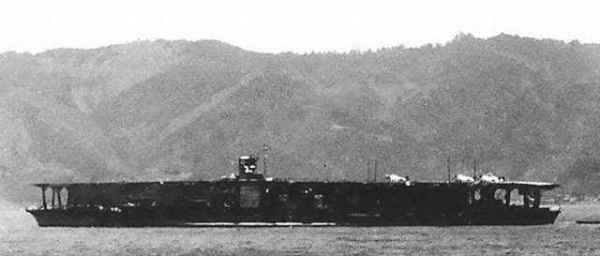
Tokyo to Berlin (Part 3 of 3):
4. If, when you tell them this, the Germans and Italians question you about our attitude toward the Soviets, say that we have already clarified our attitude toward the Russians in our statement of last July. Say that by our present moves southward we do not mean to relax our pressure against the Soviets or that if Russia joins hands tighter with England and the United States and resist us with hostilities, we are ready to turn upon her with all our might; however, right now it is to our advantage to stress the south for the time being we would prefer to refrain from any direct moves in the north.
5. This message is important from a strategic point of view and must under all circumstances be held in the most absolute secrecy. This goes without saying. Therefore, will you please impress upon the Germans and Italians how important secrecy is.
6. As for Italy, after our Ambassador in Berlin has communicated this to the Germans, he will submit a suitable translation to Premier MUSSOLINI and Foreign Minister CIANO. As soon as the date is set for a conference with the Germans and Italians, please let me know. Will you please send this message also to Rome, together with the separate message. (Costello II)
November 30, 1941: From the Diary of Lieutenant Commander Chigusa (X0 of the destroyer
Akigumo):
At last, only a week remains to "X" Day. The Akigumo is steaming eastward rapidly with a wild sound from her screw propeller. We received a signal from the Akagi, flagship of our Task Force. This was an order from Vice Admiral Nagumo calling for caution, as follows: "Our fleet just passed the 160 degree longitude (180 degrees E) and has entered the sphere of air patrols from Kiska and Midway, so please take strict precautions against the enemy's patrol planes." At this time I heard some talking in our wardroom: "What an awful experience it will be for Japanese residents in Hawaii after our air raid there."
My elder brother was living in Hawaii at that time, so I worried uncommonly about this problem after hearing these words. However, I again made up my mind to do my best in war, because I fought for my Emperor and my country. Thus I did not excuse myself from dashing to Hawaii in spite of the effect my act might have on a dear one. ....
It has been one week under continuously severe secrecy every day, earnestly observing silence without wireless, since leaving Hitokappu Bay. So as not to be found by the enemy, to take more easily and accept the challenge of a raid by the enemy and to provide a tanker location convenient for supplying the destroyers, we followed a special formation. All the ships of our fleet did their best to keep an assigned position relative to the flagship, Akagi, which was the Task Force guide. All steamed toward the east for Hawaii on the same course and at the same speed.
November 30, 1941: From the Diary of Captain Shigeshi Uchida:
Received a report that two US minesweepers headed north ten miles east of Boko Islands. (Dillon)
November 30, 1941: Tokyo to Berlin (Part 1 of 2):
The motive of the United States in all this was brought out by her desire to prevent the establishment of a new order by Japan, Germany and Italy in Europe and the Far East, that is to say, the aims of the Tri-Partite Alliance. As long as the Empire of Japan was in alliance with Germany and Italy, there could be no maintenance of friendly relations between Japan and the United States was the stand they took. From this point of view, they began to demonstrate a tendency to demand the divorce of the Imperial Government from the Tri-Partite Alliance. This was brought out at the last meeting. That is to say that it has only been in the negotiations of the last few days that it has become gradually more and more clear that the Imperial Government could no longer continue negotiations with
the United States... (Costello II)
Tokyo to Berlin (Part 2 of 2):
3. The proposal presented by the United States on the 26th made this attitude of theirs clearer than ever. In it there is one insulting clause which says that no matter what treaty either party enters into with a third power it will not be interpreted as having any bearing upon the basic object of this treaty, namely the maintenance of peace in the Pacific. This means specifically the Three-Power Pact. It means that in case the United States enters the European war at any time, the Japanese Empire will not be allowed to give assistance to Germany and Italy. It is clearly a trick. This clause alone, let alone others, makes it impossible to find any basis in the American proposal for negotiations. What is more, before the United States brought forth this plan, they conferred with England, Australia, the Netherlands, and China—they do so repeatedly. Therefore, it is clear that the United States is now in collusion with those nations and has decided to regard Japan, along with Germany and Italy, as an enemy. (Costello II)
December 1, 1941: From the Diary of Rear Admiral Giichi Nakahara:
The point of the American answer.
1. Respect for Nine-Power Treaty in Asia.
2. Evacuation of Japanese armed forces from China and French Indo-China (includes Manchuria).
3. Open Door principle of the Chinese Continent, equality of trade and commerce.
4. Trade and commerce under barter system.
5. Parting from Axis Party. Etc. Eight articles in all; but, in short, it is not unthinkable to dispose of the China Incident and to establish the Greater Far Asiatic Co-Prosperity Sphere, and that the United States does not recognize the independence of Japan; now it is high time for Japan to decide with resolution. (Dillon)
December 1, 1941
: Washington to Tokyo:
We realize of course that an attempt to have President Roosevelt and former Premier Konoye meet (could) fail. Bearing in mind the reaction to that in our nation, it may be to our interest to first ascertain the US attitude
regarding the possibility... (Costello II)
Navy Order No. 9: Order to: Yamamoto, C in C, Combined Fleet:
1. Japan has decided to open hostilities against the United States, Great Britain, and the Netherlands early in December.
2. The Commander-in-Chief of the Combined Fleet will smash the enemy fleets and air forces in the Orient and at the same time will intercept and annihilate enemy fleets should they come to attack us.
3. The Commander-in-Chief of the Combined Fleet will occupy immediately the key bases of the United States, Great Britain, and the Netherlands in East Asia in close cooperation with the Commander-in-Chief of the Southern Army and will capture and secure the key areas of the southern regions.
4. The Commander-in-Chief of the Combined Fleet will cooperate with the operations of the China Area Fleet, if necessary.
5. The time of the start of operations based on the aforementioned items will be made known later.
6. The Chief of the Naval General Staff will issue instructions concerning particulars. (Dillon)
December 1, 1941: Tokyo to Washington:
When you are faced with the necessity of destroying codes, get in touch with the Navel Attaché’s office there and make use of the chemicals they have on hand for this purpose. The Attaché should have been advised by the Navy Ministry regarding this. (Costello II)
December 1, 1941: From the Diary of Captain Shigeshi Uchida:
In the afternoon the Imperial Conference was held in which a decision was made to go to war. After the conference ended, the Emperor asked both heads of the Army and Navy General Staffs to stay and told them that, since this war bears the most important thing, the Army and Navy should do their best in cooperating closely. The Army Chief of Staff, representing both services, swore that the Emperor's will would be complied with to the utmost. In the afternoon today a report came in that three big US planes went southeast of the southernmost cape of Formosa. (Dillon)
December 1, 1941: Tokyo to London:
Please discontinue the use of your code machine and dispose of it immediately. In regard to the disposition of the machine please be very careful to carry out the instructions you have received regarding this. Pay particular attention to taking apart and breaking up the important parts of the machine. As soon as you receive this telegram wire the one word SETUJU in plain language and as soon as you have carried out the instructions wire the one word HASSO in plain language. Also at this time you will of course burn the machine code and YU GO No. 26 of my telegram. (The rules for use of the machine between the head office and the Ambassador resident in England.) (Costello II)
December 1, 1941: The Japanese fleet code is changed an unprecedented second time in one month.
December 1, 1941: From the Diary of Commander Sadamu Sanagi:
At 1400 a conference was held in audience with the Emperor. The Imperial Order directing use of armed strength was issued. (Dillon)
December 1, 1941: Tokyo to Hsinking:
In the event that Manchuria participates in the war…in view of various circumstances it is our policy to cause Manchuria to participate in the war in which event Manchuria will take the same steps toward England and America that this country will take in case war breaks out. A summary follows:
1. American and British consular officials and offices will not be recognized as having special rights. Their business will be stopped (the sending of code telegrams and the use of short wave radio will be forbidden). However it is desired that the treatment accorded them after the suspension of business be comparable to that which Japan accords to consular officials of enemy countries resident in Japan.
2. The treatment accorded to British and American public property, private property, and to the citizens themselves shall be comparable to that accorded by Japan.
3. British and American requests to third powers to look after their consular offices and interests will not be recognized. However the legal administrative steps taken by Manchukuo shall conform to the provisions of the Japanese-Soviet neutrality pact. Great care shall be exercised not to antagonize Russia. (Costello II)
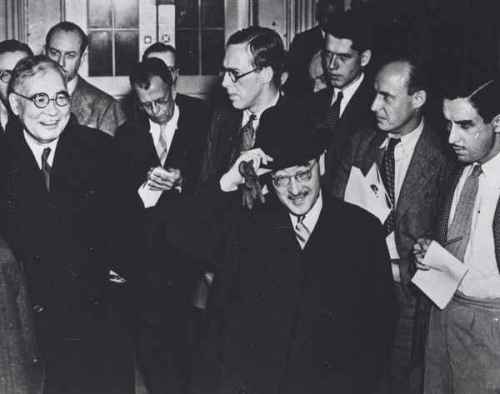
Tokyo to Washington:
1. The date set… (November 25, 1941) …has come and gone, and the situation continues to be increasingly critical. However, to prevent the United States from becoming unduly suspicious we have been advising the press and others that though there are some wide differences between Japan and the United States, the negotiations are continuing. (The above is only for your information.) .…
3. There are reports here that the President’s sudden return to the capital is an effect of Premier Tojo’s statement. We have an idea that the President did so because of his concern over the critical Far Eastern situation. Please make investigations into this matter. (Costello II)
December 1, 1941: From a memorandum regarding a conversation between Secretary Of State Hull, Japanese Ambassador Nomura, and Mr. Kurusu:
The Secretary said that he had been talking peace for nine months with the Japanese Ambassador, both of them acting in entire good faith. He said that during all the time that Matsuoka was holding forth on the Tripartite Alliance and engaging in general bluster, the Secretary had ignored all of that. Then while the talks were in progress last July the Japanese moved suddenly into Indochina without any advance notice to this Government, and possibly the Ambassador was not informed of the Japanese Government's intention in advance. Then, too, the Secretary said, the Japanese press had been conducting a blustering campaign against the United States. The Secretary said that this Government had no idea of trying to bluff Japan and he saw no occasion for Japan's trying to bluff us, and he emphasized that there is a limit beyond which we cannot go further and that one of these days we may reach a point when we cannot keep on
as we are... From the Diary of Lieutenant Commander Chigusa (X0 of the destroyer
Akigumo):
The roll of the ship was severe...We enjoyed a piece of Yokan (sweetened bean jelly) for our midnight supper. I had a dream that my wife, Fumiko, and I were together, but we had moved somewhere.
December 1, 1941: London to Tokyo:
It is feared that in the event of the situation becoming critical the exchange of telegrams may become impossible. I therefore submit the following points for your consideration and request instructions.
1. In view of conditions at this post, countries suitable for protecting our interests after the withdrawal of this Embassy are BRAZIL or SWITZERLAND. I suggest that the matter be discussed in TOKYO with the country concerned, so that instructions may be sent by that Government to its Ambassador (Minister) in LONDON.
2. Is there any objection to burning the consular exequaturs at present held in custody…
3. The stipulations for withdrawal of the Embassy etc. staffs and of resident Japanese should be made with the British on a strictly reciprocal basis. If this could be done it would be necessary to effect the exchange at a stipulated place, each side providing a ship. An agreement would have to be drawn up regarding the dates of departure, etc. to prevent anything going amiss. (In case of GERMANY the exchange took place in HOLLAND, in ITALY’s case it was LISBON. If hostages are taken there is the danger that our nationals will not be able to leave the country.) … (Costello II)
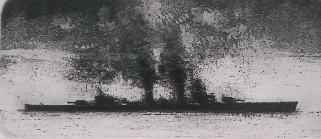
From the Diary of Lieutenant Commander Chigusa (X0 of the destroyer
Akigumo):
A strong south wind at 18 m (35 kts). The field of vision is short owing to heavy drizzle we occasionally encountered. At last the matter which I had so eagerly looked forward to occurred today. This was the signal from the flagship to report the issuance of an Imperial Command saying: "X day is decided for the 8th (Note: 7th Hawaiian time)." All the crew were in high spirits to know that the decision for "X" Day was now made.
The greatest degree of roll today reached 47 degrees to one side, which was the largest swell since leaving Hitokappu Bay, and of course I hadn't experienced anything like it ever before. Severe rolling like this was a fight and trial against nature, which was a real task for a small ship like our destroyer. All dishes placed on the table for our lunch were thrown to the floor, and rolled about here and there. Osushi (special rice seasoned with vinegar) was our supper, but not of very good flavor. However, this was no wonder, with such stormy weather Hard biscuits which we had for emergency food were all that was served for our midnight supper. I again had a dream of my wife, Fumiko, and my children.
December 2, 1941: From the Diary of Commander Sadamu Sanagi:
The
Tarsuta-Maru left Yokohama heading for North America. Thirty-five foreign evacuees were on board. (Dillon)
December 2, 1941: Washington to Tokyo (Part 1 and 2)
:
The people of Japan are faced with economic pressure, and I want you to know that we have but the choice between submission to this pressure or breaking the chains
that it invokes... (Costello II)
Yamamoto signals Nagumo's fleet "Climb Mount Nitaka," the code to proceed with the attack.












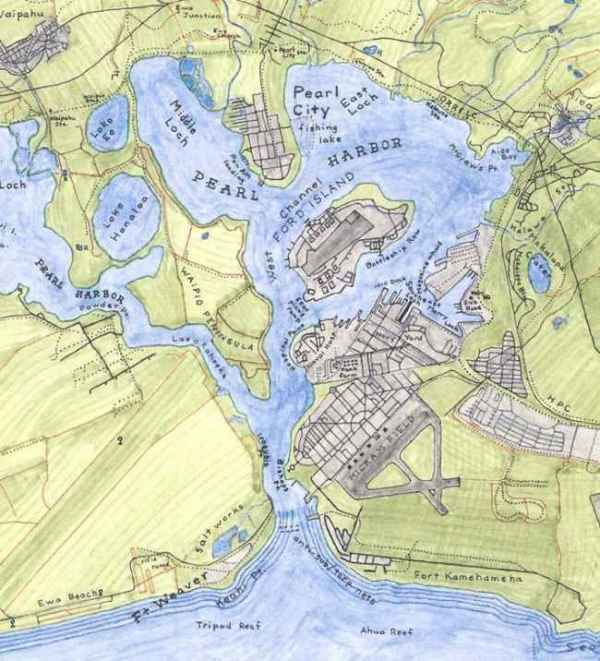

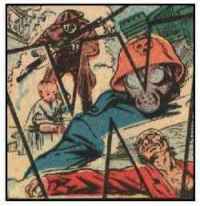
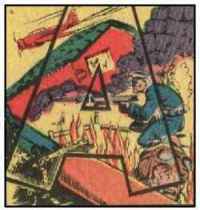
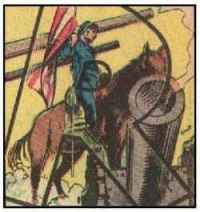
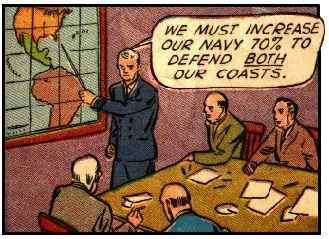
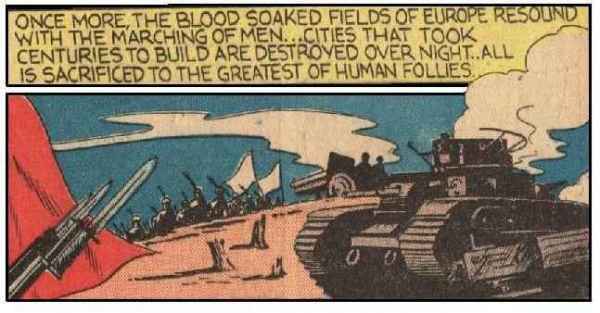
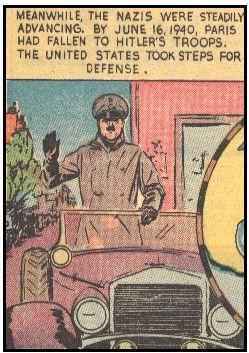
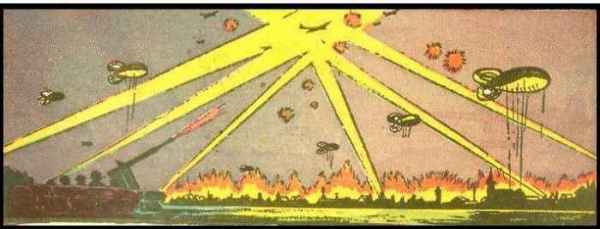
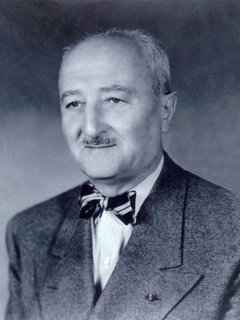
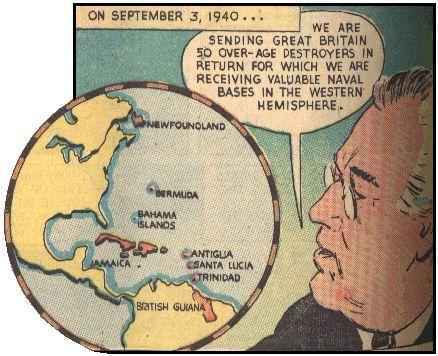
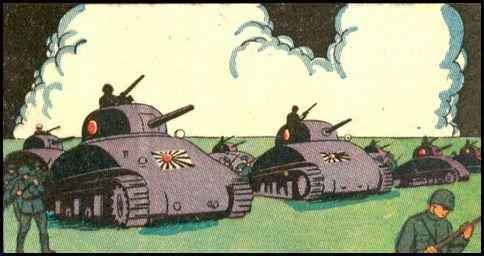
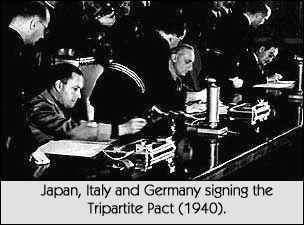
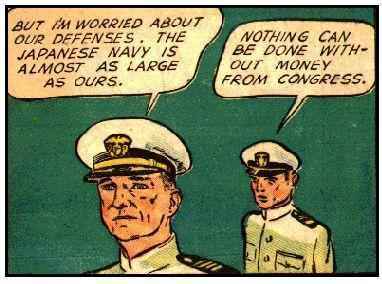
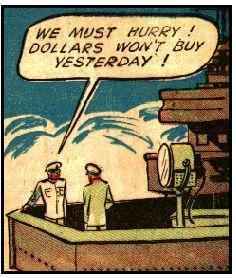
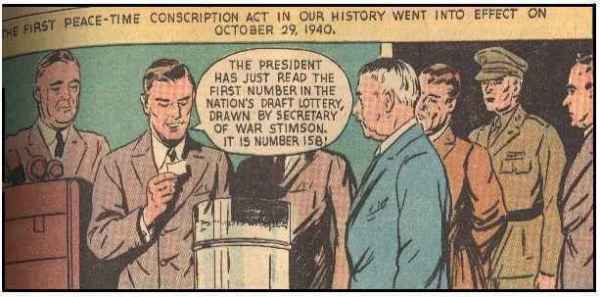

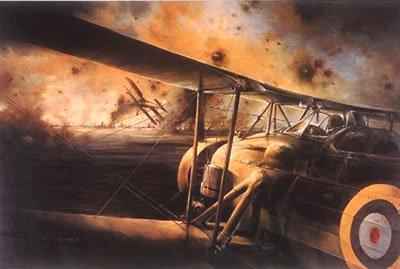
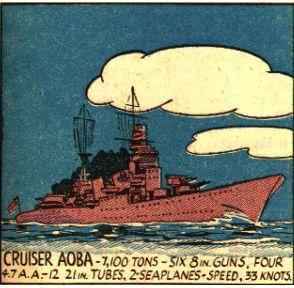
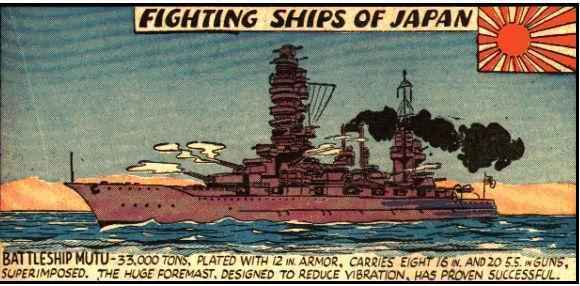

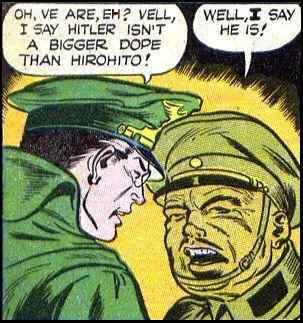
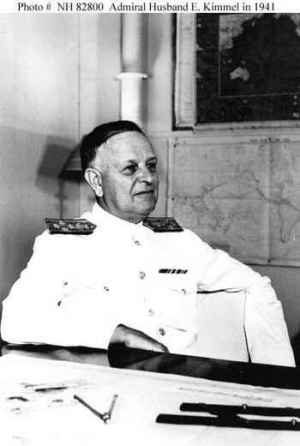
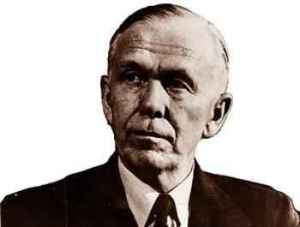
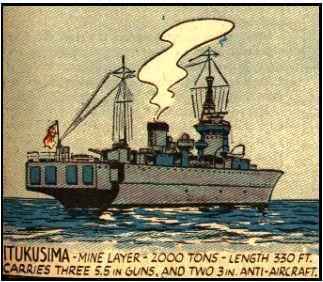
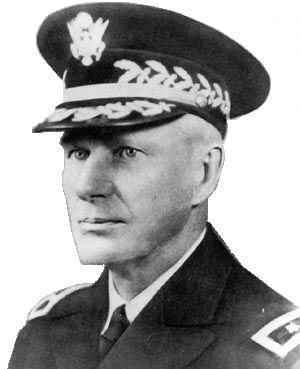

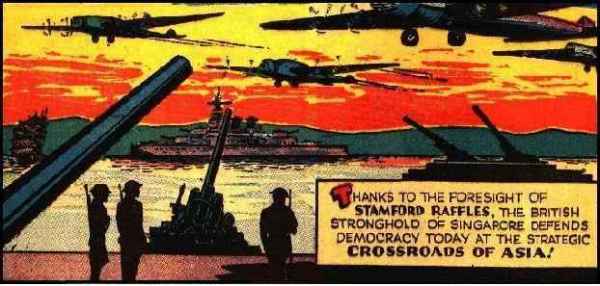

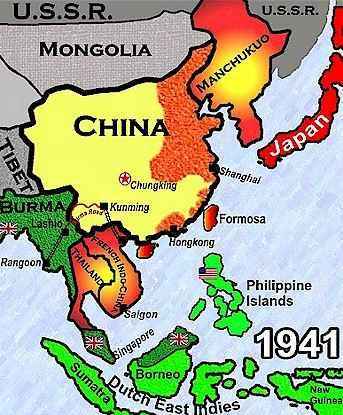
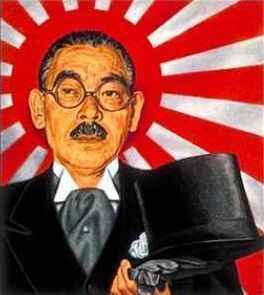


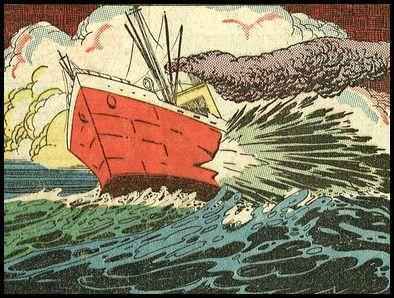

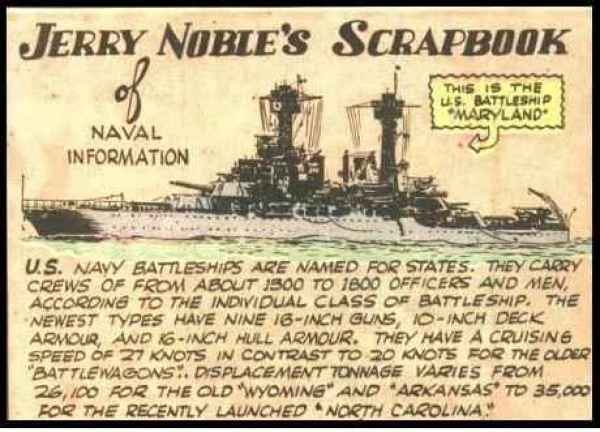
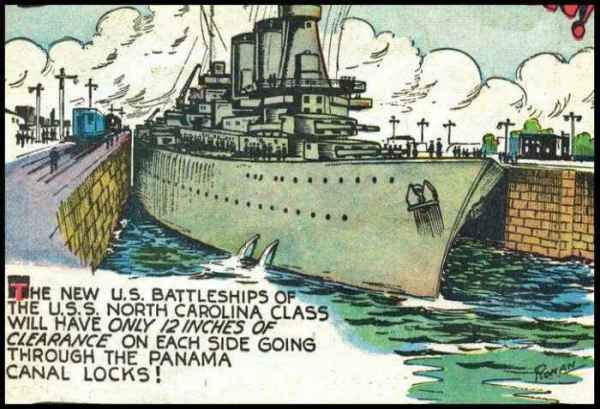
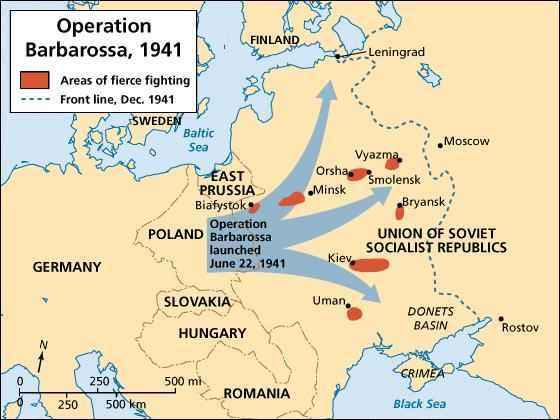
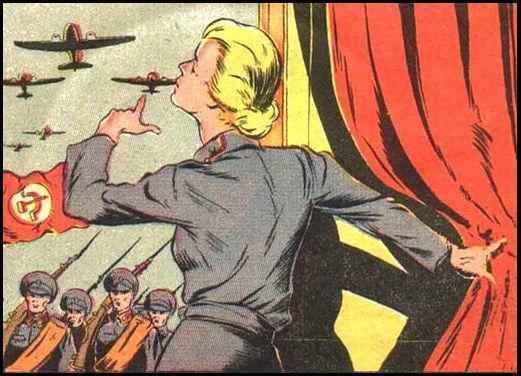
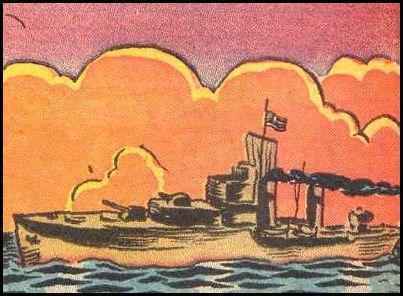
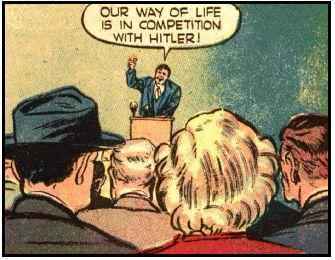


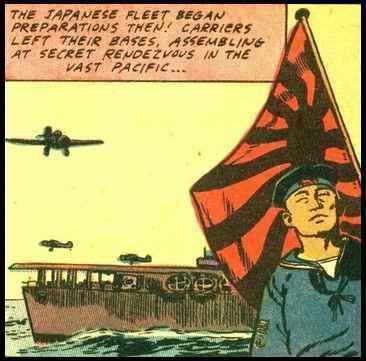
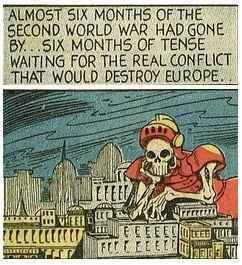
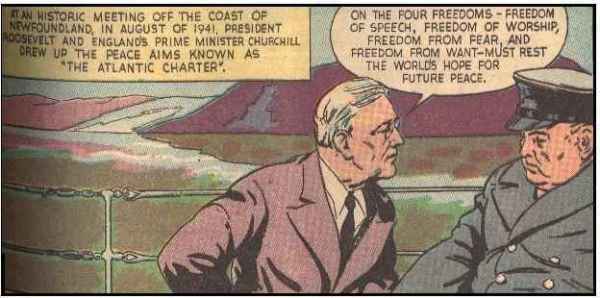
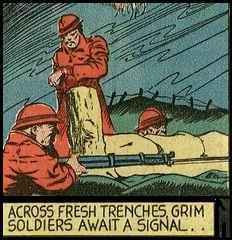
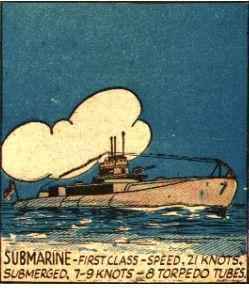
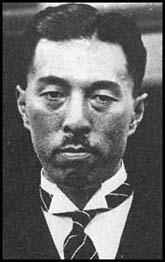
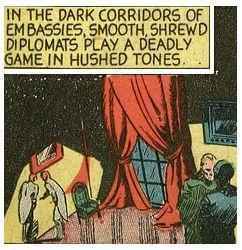
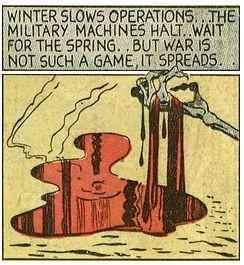
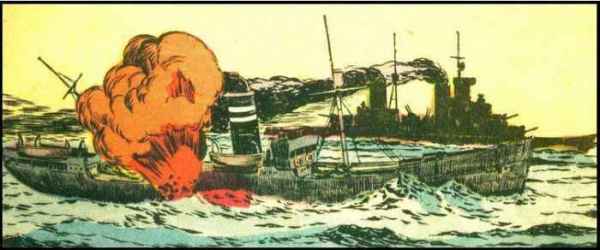
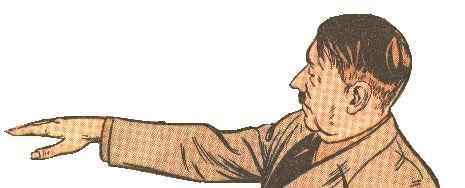
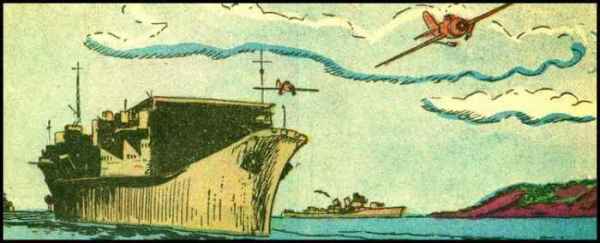
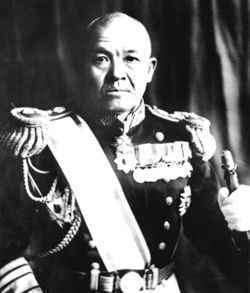





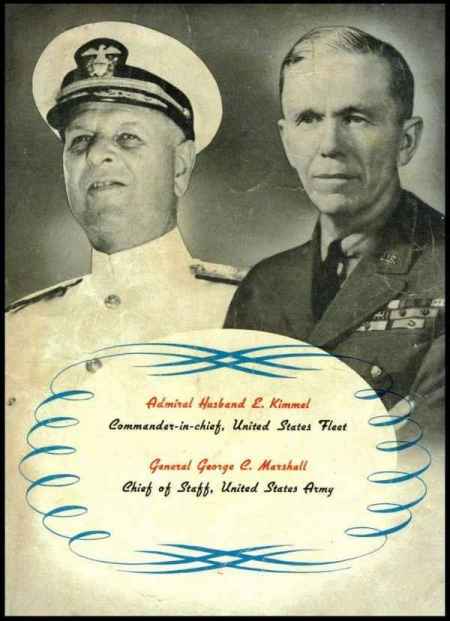
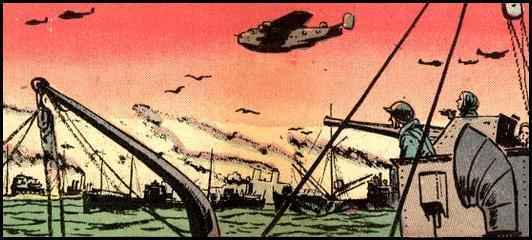
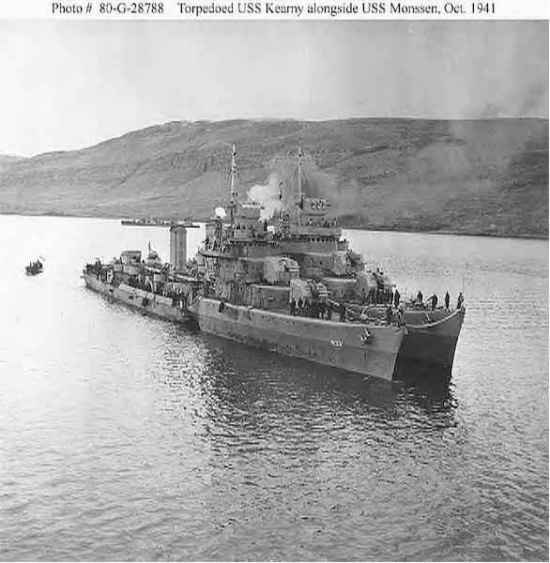
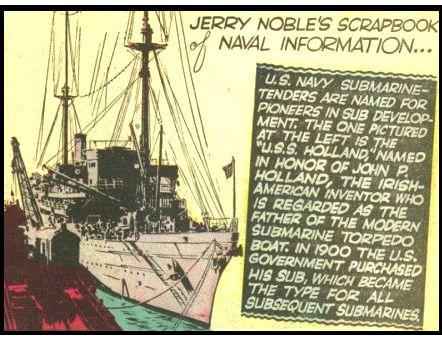
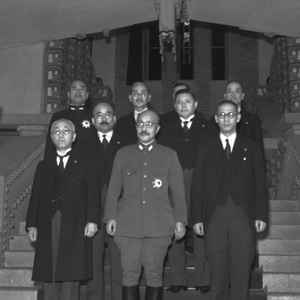


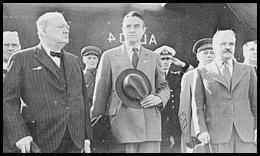
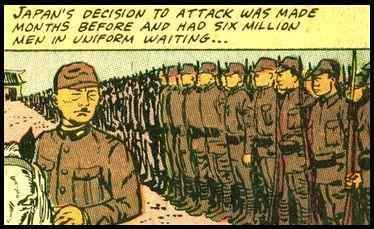

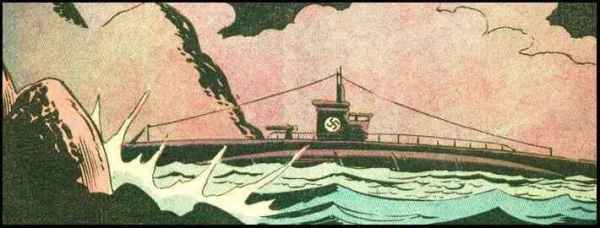
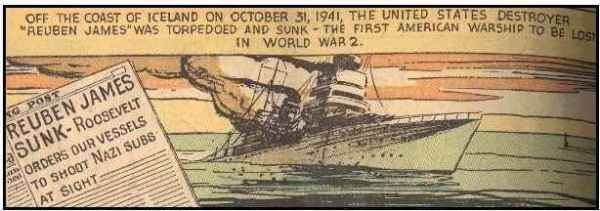
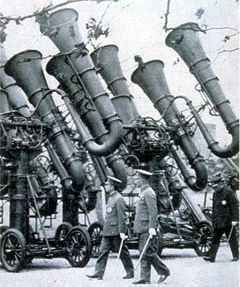
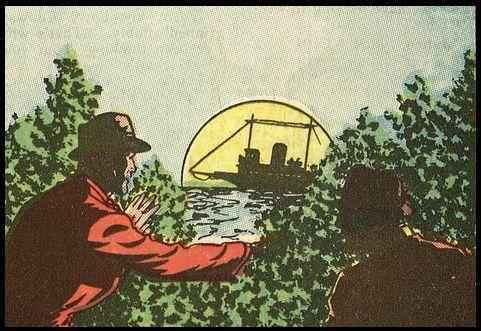
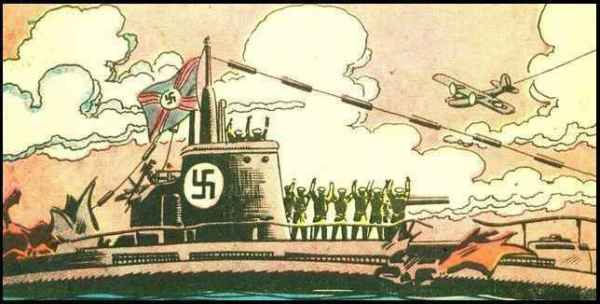


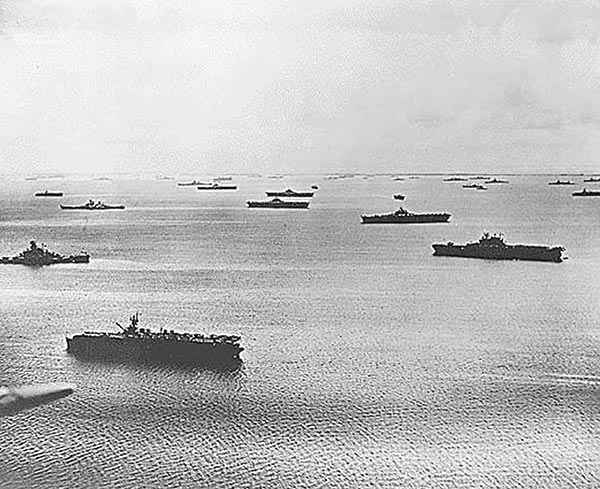
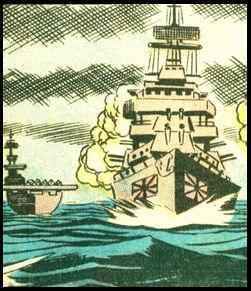
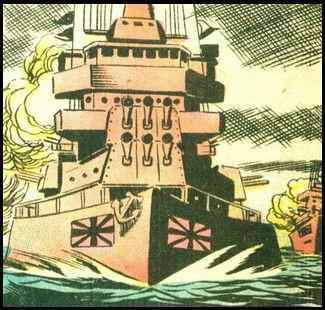
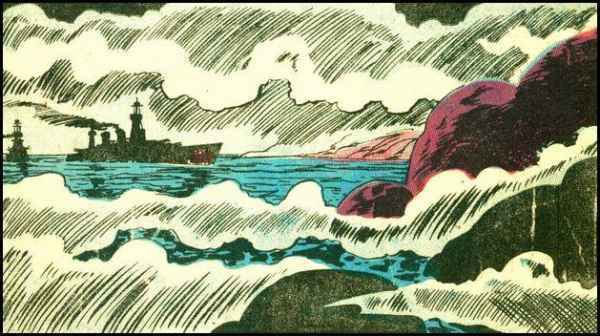
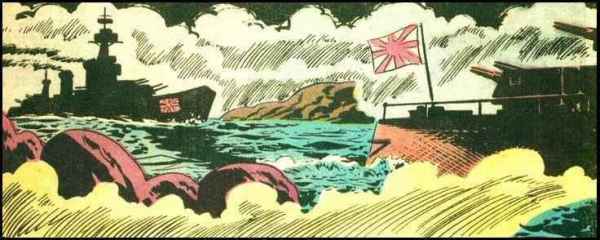

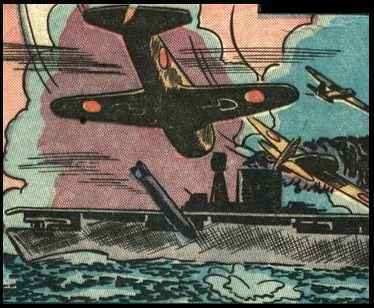

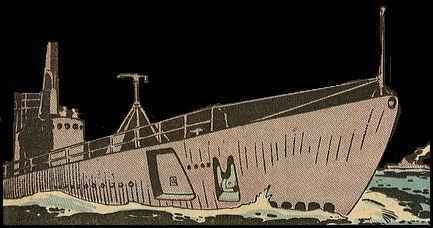

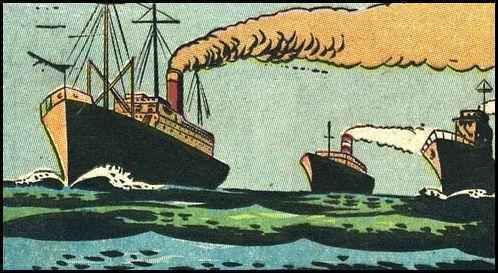



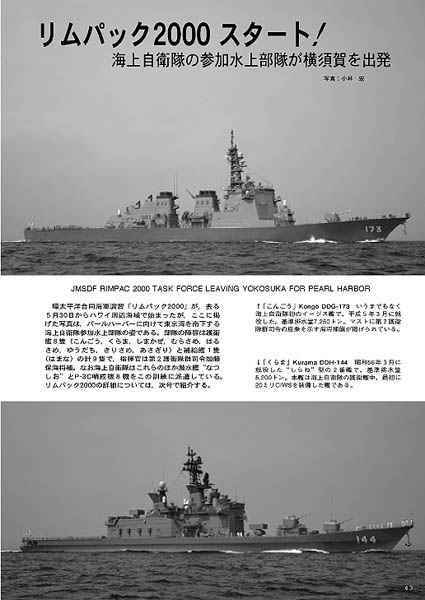
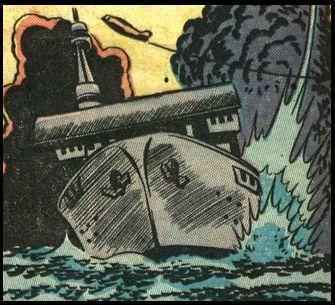
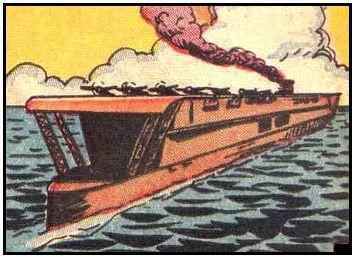
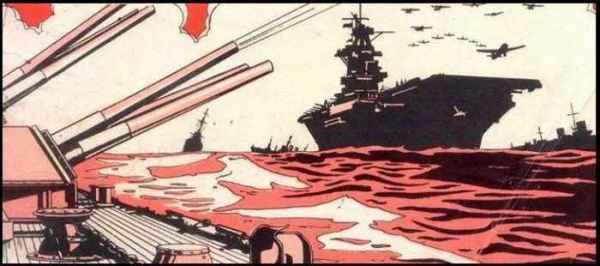
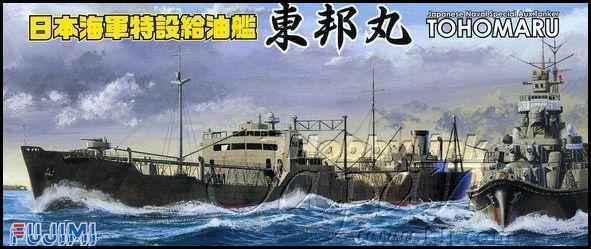

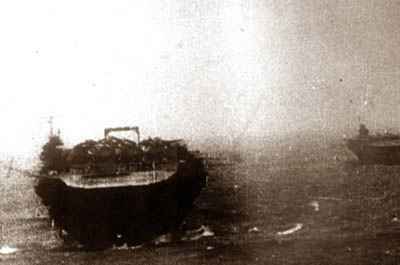



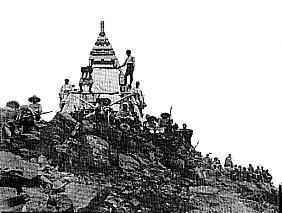

Click for Part Three!
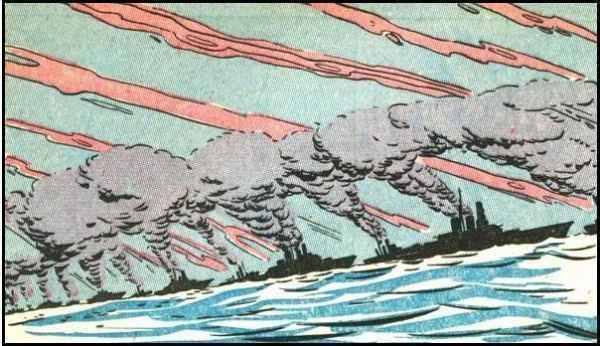







 Twitter: @3rdReichStudies
Twitter: @3rdReichStudies




>







